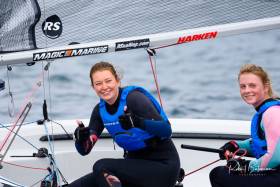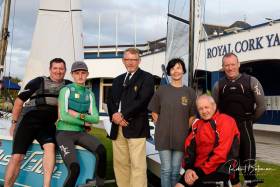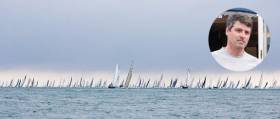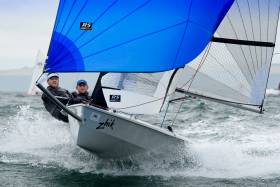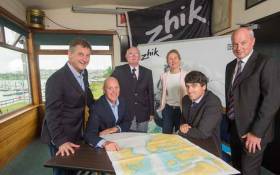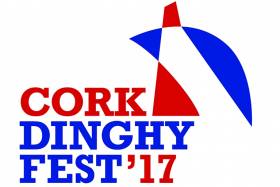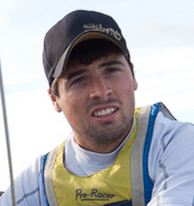Displaying items by tag: Dinghy Fest
DinghyFest Winners at Royal Cork Yacht Club (Photo Gallery)
There some clean sweeps across the eight classes at Royal Cork Yacht Club's 2019 Dinghy Fest Championships held in Cork Harbour at the weekend writes Bob Bateman.
One of the biggest fleets of the weekend was the 19-boat Rankin World Championships fleet. Conor and Robbie English sailing ARC from the host club were runaway winners with wins in each of the five races. Second was Cobh Sailing Club's Ewan and David O Keeffe with Dan O'Connell John Hales third. The size of the victory in the 19-boat fleet also bestowed overall Dinghyfest Championship Status on the English brothers.
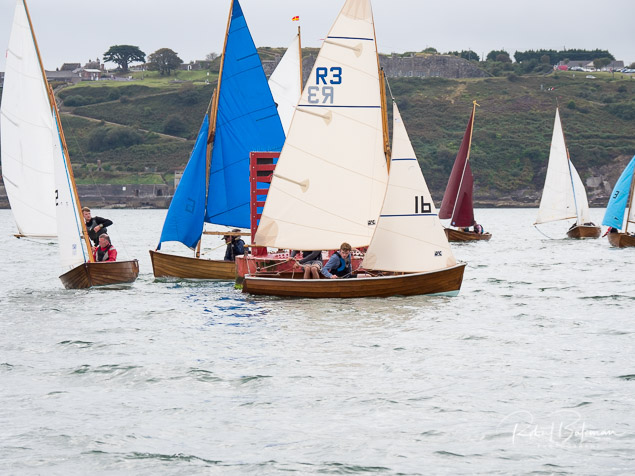 Racing for Rankin Dinghy World Honours at DinghyFest 2019 Photo: Bob Bateman
Racing for Rankin Dinghy World Honours at DinghyFest 2019 Photo: Bob Bateman
Three firsts and three seconds gave Royal Cork's Harry Twomey and Harry Durcan a three-point winning margin in the 12-point 29er Southern Championships. Clubmates Lola and Atlee Kohl sailing Illegal Entry were second with Dublin Bay's Elysia O'Leary crewed by RCYC's Chris Bateman third.
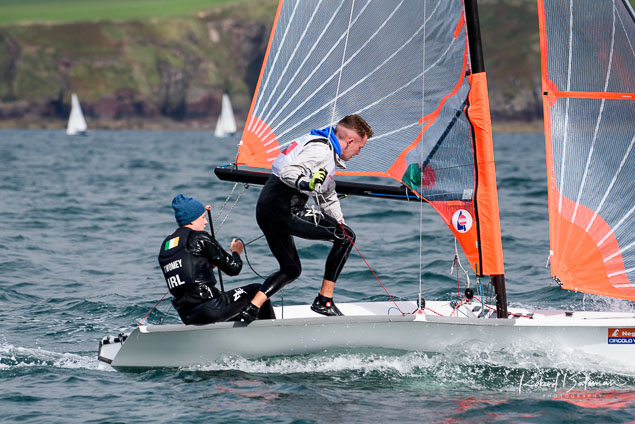 Royal Cork's Harry Twomey and Harry Durcan
Royal Cork's Harry Twomey and Harry Durcan
In a clean sweep for Belfast Lough in the Irish Multihull Championships, Adrian Allen and Barry Swanston of Ballyholme Yacht Club were winners by four points after six races in the ten boat fleet. Clubmates Matthew and James McNicholl were second and Mat McMurtry and Emma Greer were third.
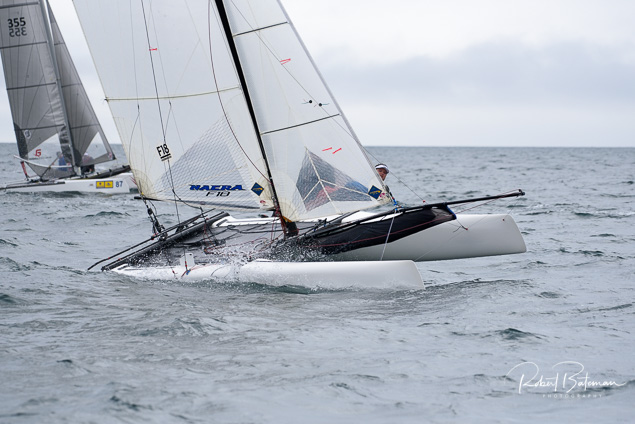 Formula 18s raced for Irish Multihull honours
Formula 18s raced for Irish Multihull honours
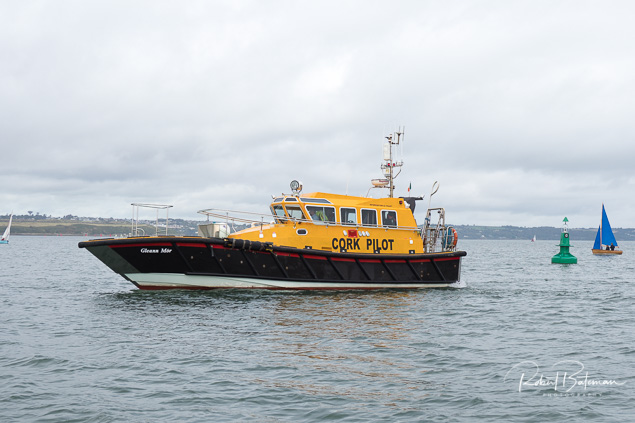 The Port of Cork sent a Pilot Boat to visit DinghyFest 2019 at Crosshaven
The Port of Cork sent a Pilot Boat to visit DinghyFest 2019 at Crosshaven
There appears to be no stopping Eoghan Duffy and Cathal Langan in the Mirror class this season and the Mirror Southern Championships raced as part of DinghyFest was no different. The Lough Ree Yacht Club duo lost the opening race of six but won the remaining to win by nine points overall. Second was another Lough Ree Yacht Club pair Luke Johnston and Sarah White with Jessica and Mark Greer from Sligo Yacht Club third.
Ewan Barry, Stanley Browne and Richard Leonard sailing Stormy D are the new National 18 Champions by three points after six races sailed in an 11-boat fleet. The trio won three races to be ahead of the Johnny Durcan skippered Aquaholics. Charles Dwyer's Shark II sailing with John Coakley and Peter Stokes, the winners of August's Cock O' The North trophy, were third.
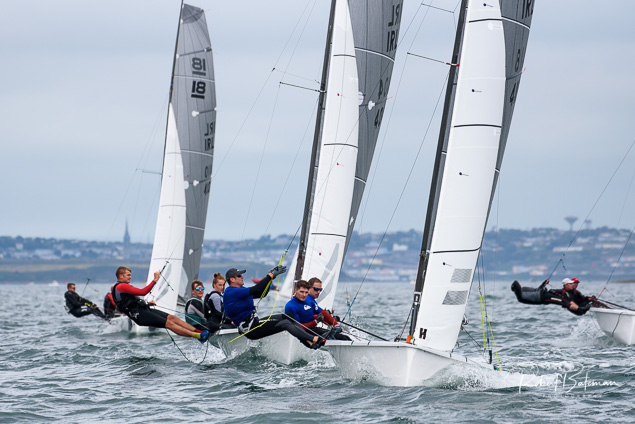 Close racing for National 18s at a DinghyFest 2019 Weather Mark
Close racing for National 18s at a DinghyFest 2019 Weather Mark
In the 19-boat RS 200 Southern Championships fleet, Olympic Finn campaigner, Fionn Lyden sailing with Amy Harrington from Baltimore Sailing Club were overall winners with Donal O'Halloran and Nigel Young sailing under the burgee of Royal Cornwall YC were second. Erica Ruigrok and Sally Bell from Rush Sailing Club were third.
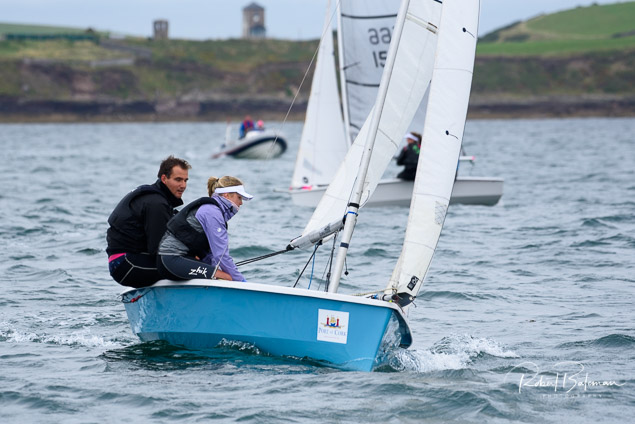 Fionn Lyden sailing with Amy Harrington in the RS200
Fionn Lyden sailing with Amy Harrington in the RS200
In th smaller seven boat RS 400 fleet, thiRSty sailed by Govan Berridge David Coleman of Killaloe Sailing Club won after six races sailed from RCYC's Luke McGrath and Cian Jones. Third was Playbuoy sailed by Northern Ireland's Ryan Glynn and William Findlay from Strangford Sailing Club.
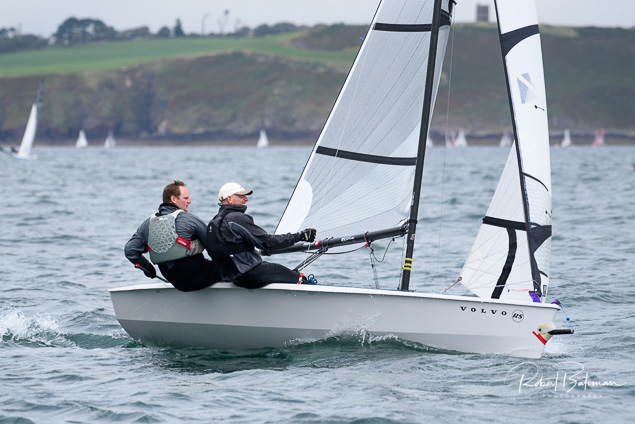 RS400 racing
RS400 racing
Finally, Harry and Simon Pritchard from Monkstown Bay Sailing Club were winners of the RS Feva Southern Championships with six straight wins in the ten boat class. Cork Harbour crews Patrick Bruen and James Murphy were second with David Mcsweeney and George O Keeffe third.
See photo gallery below by Bob Bateman. Overall results here
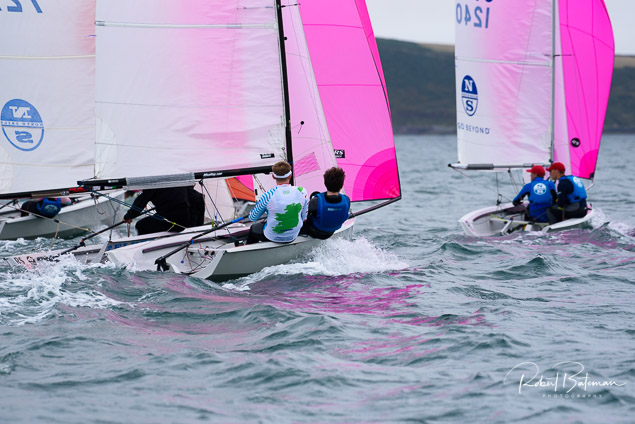
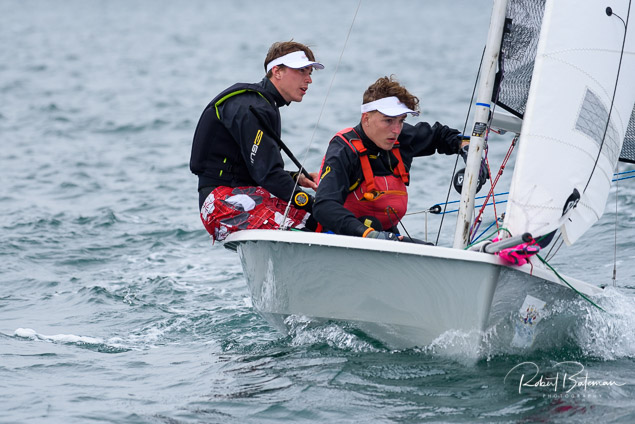
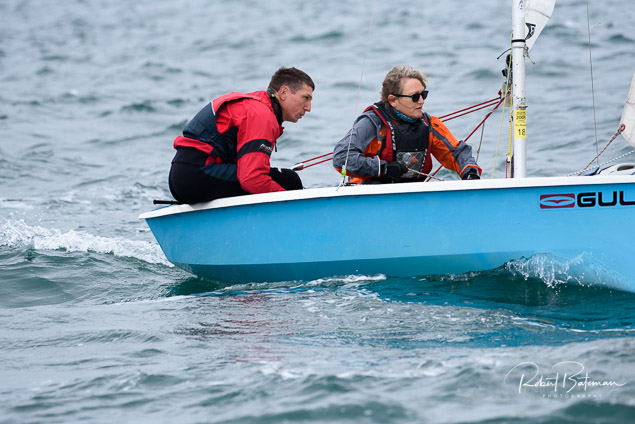
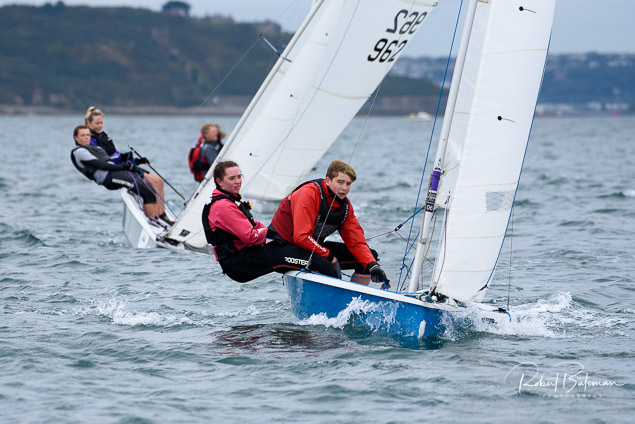
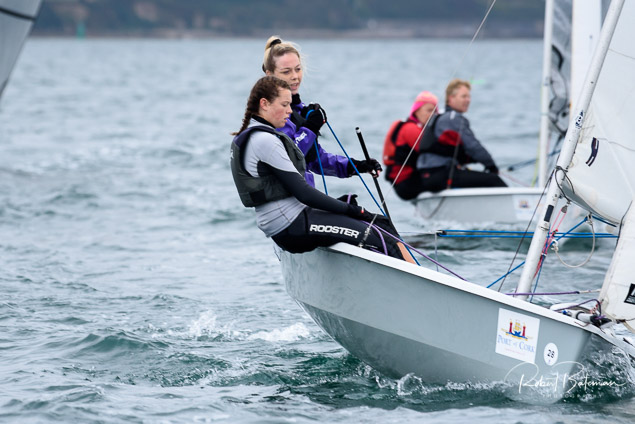
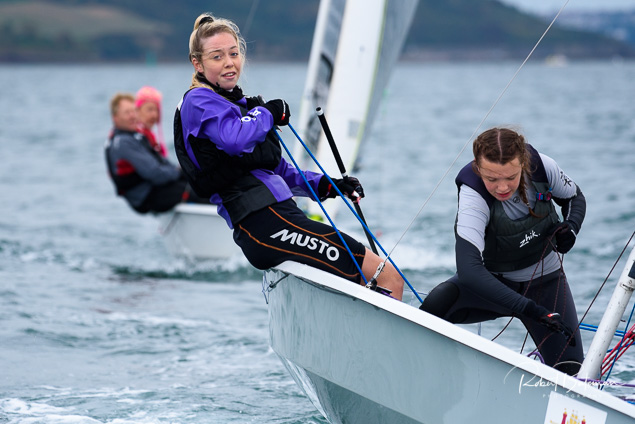
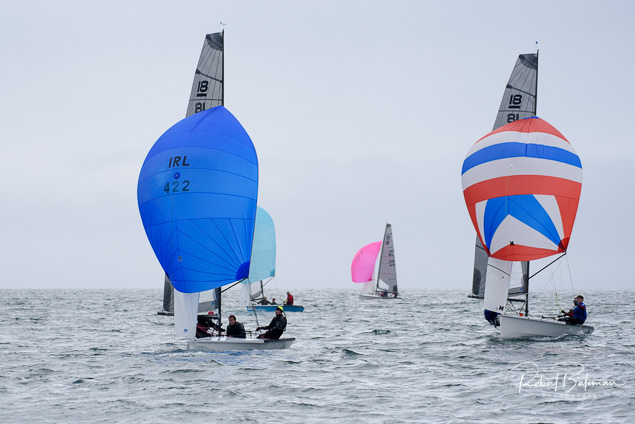
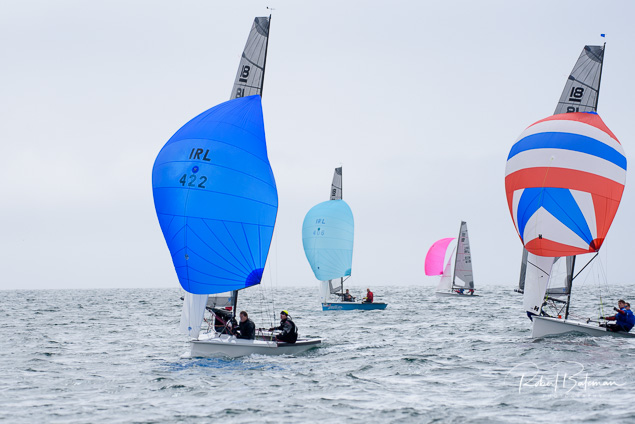
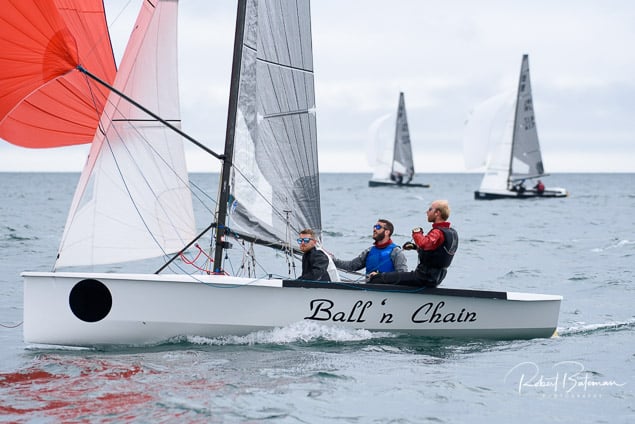
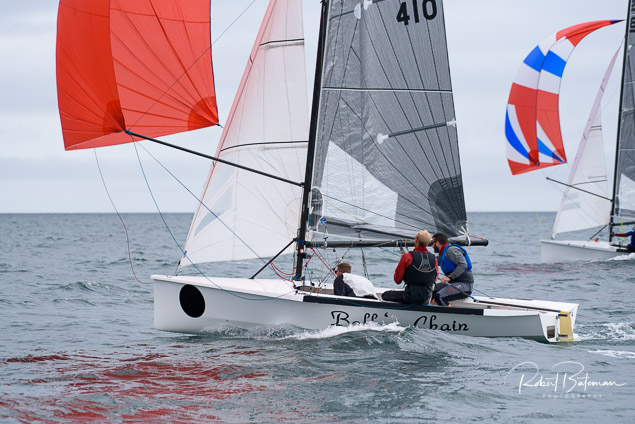
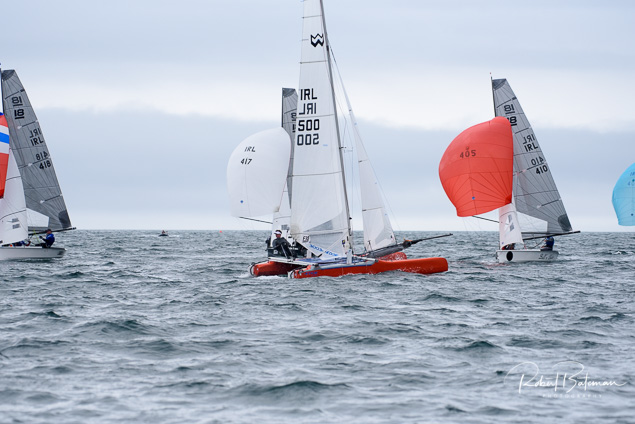
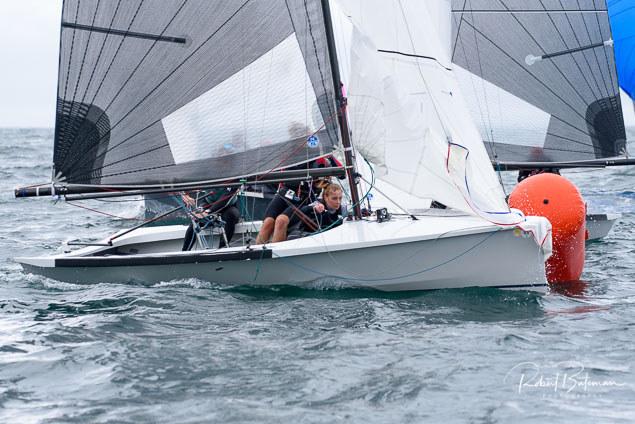
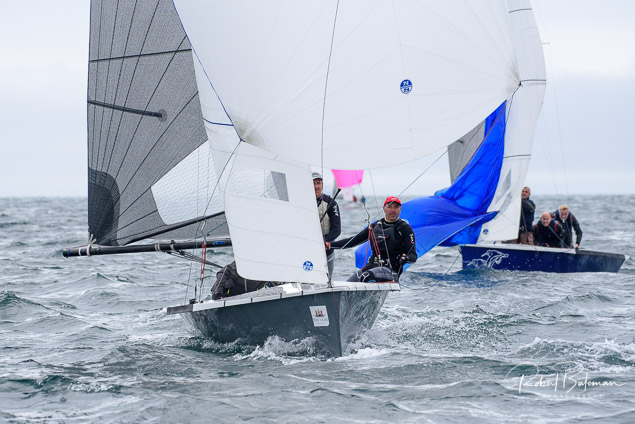
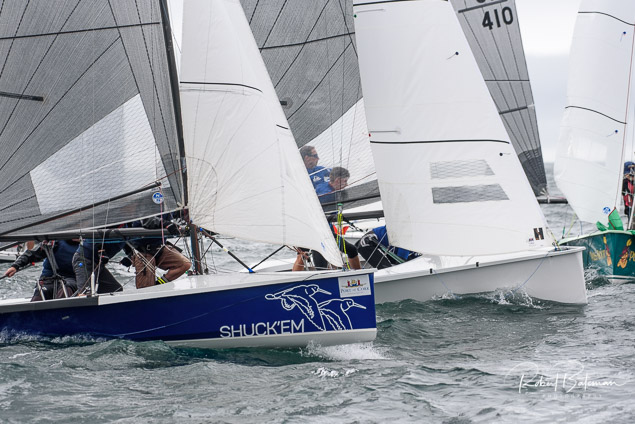
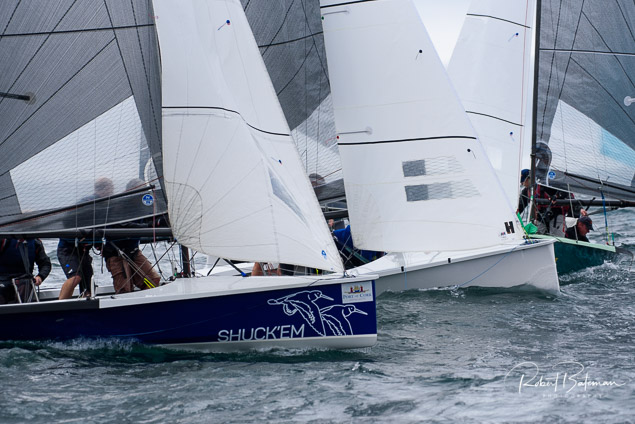
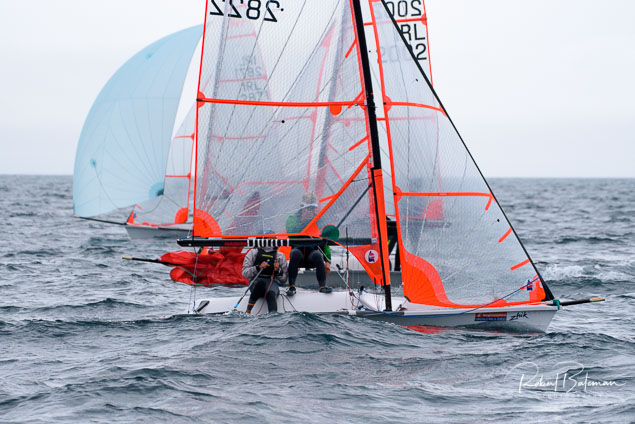
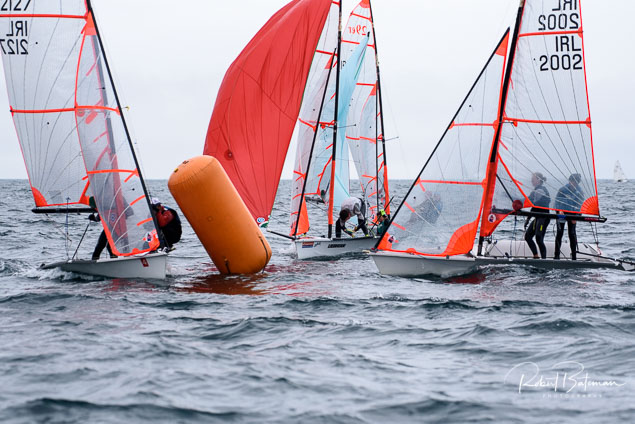
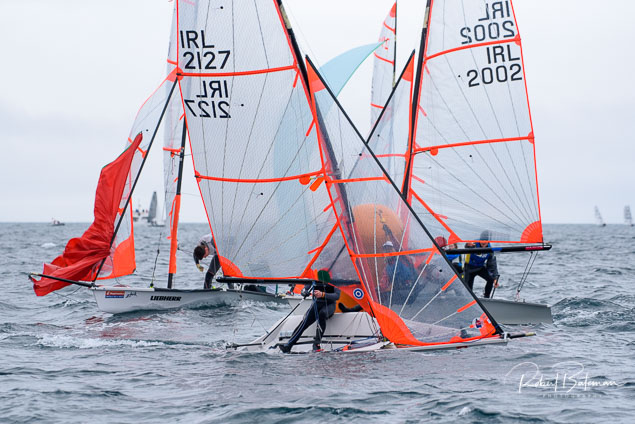
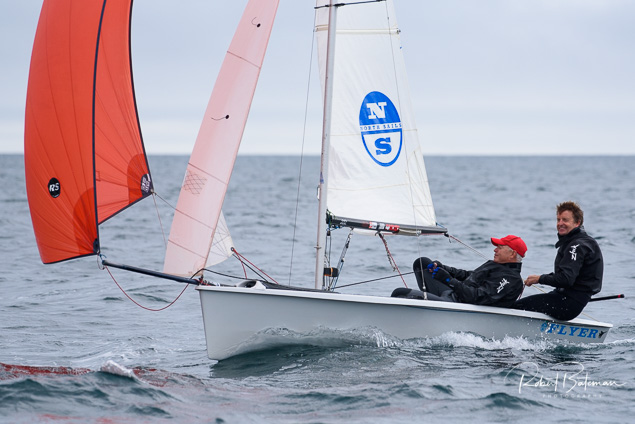
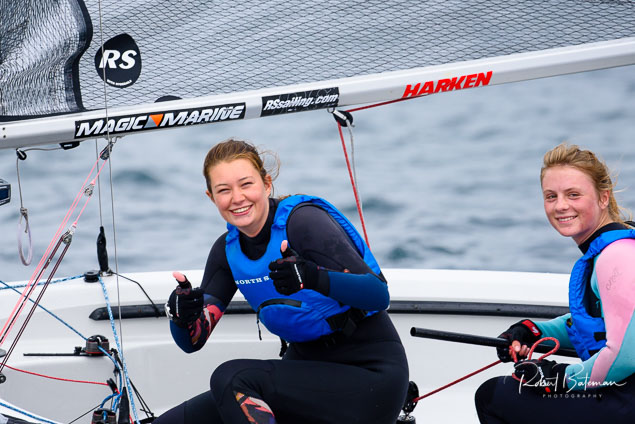
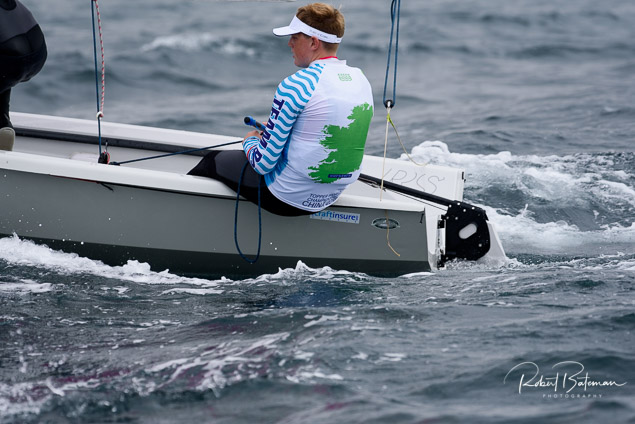
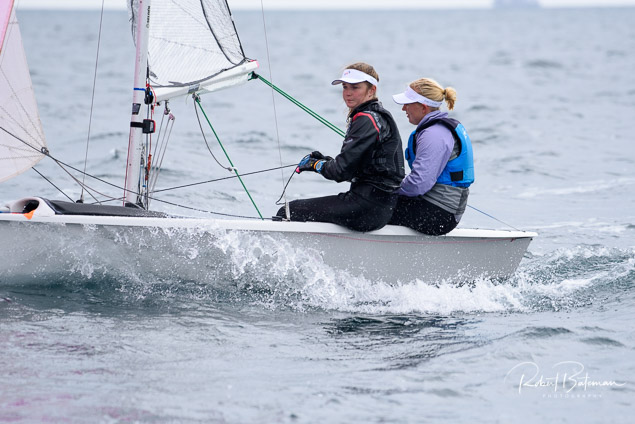
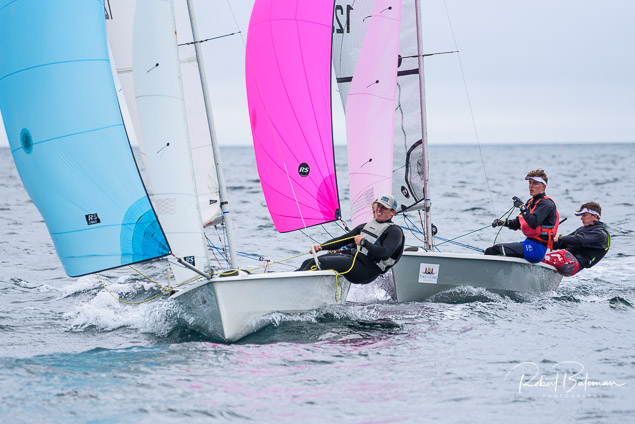
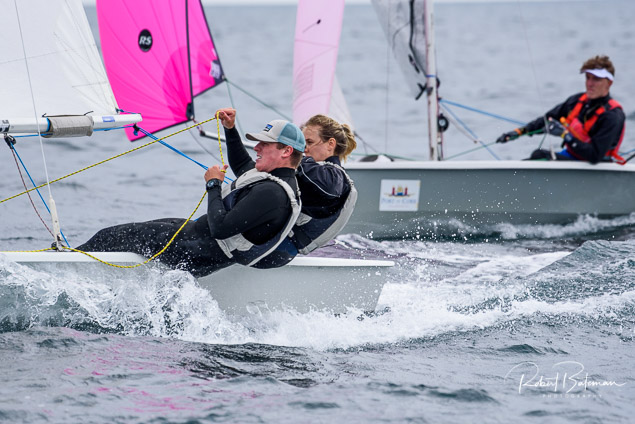
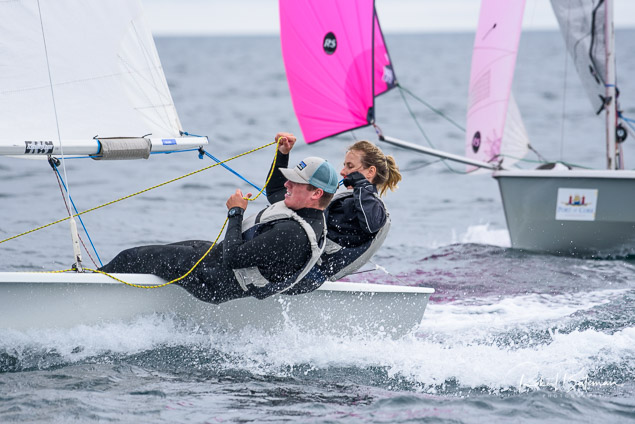
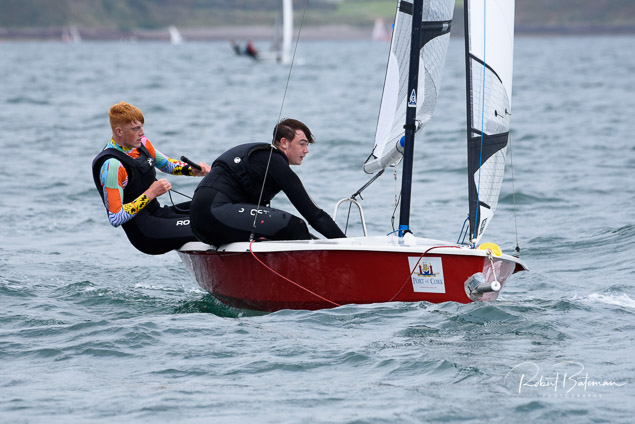
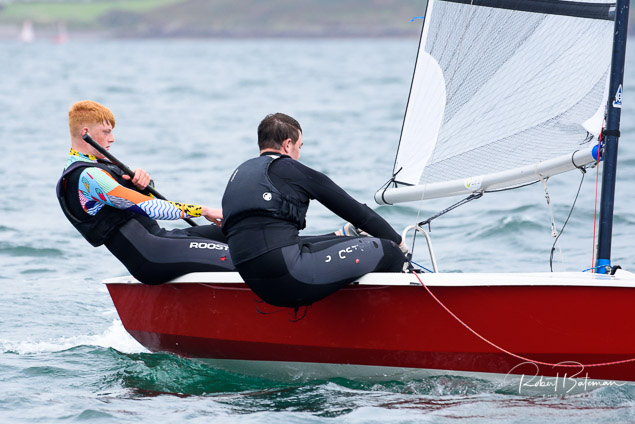
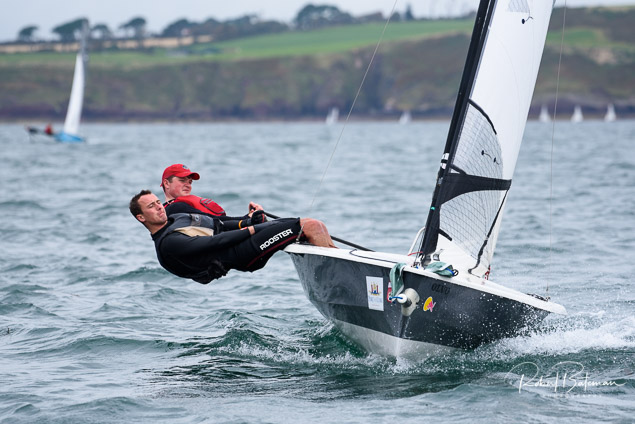
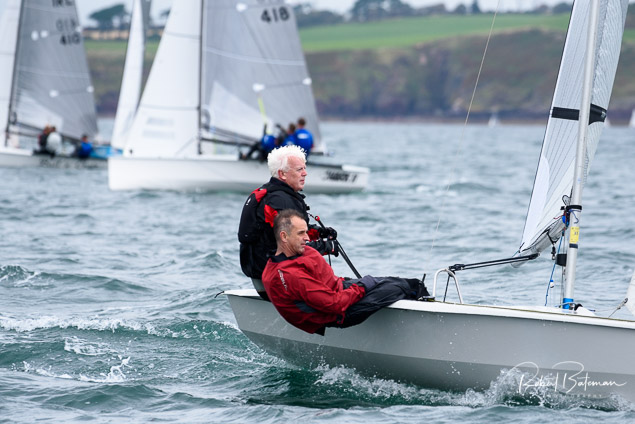
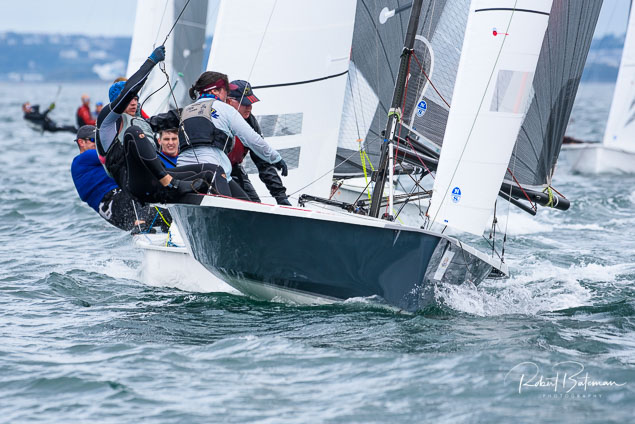
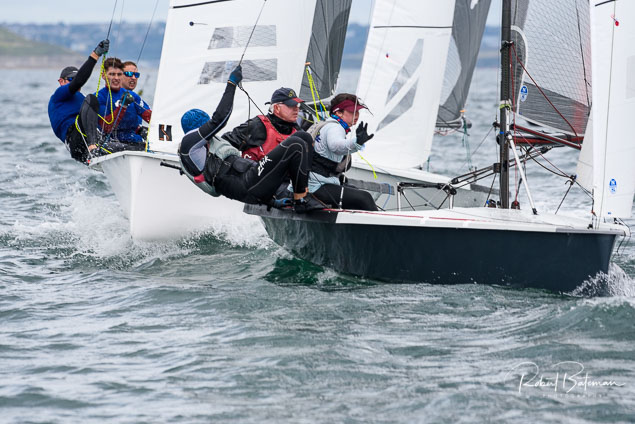
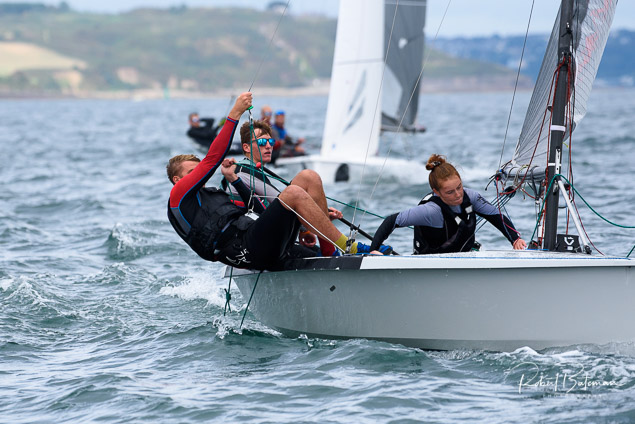
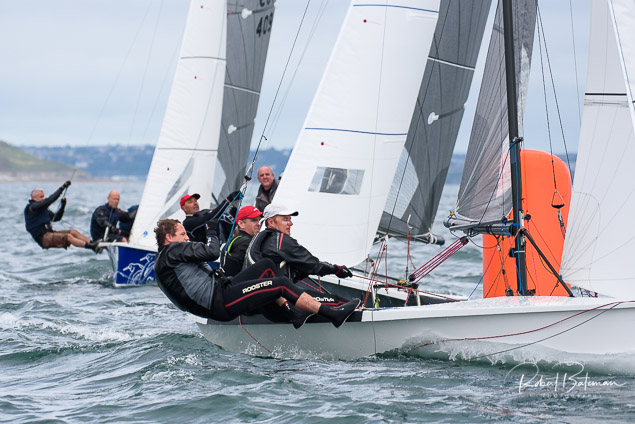
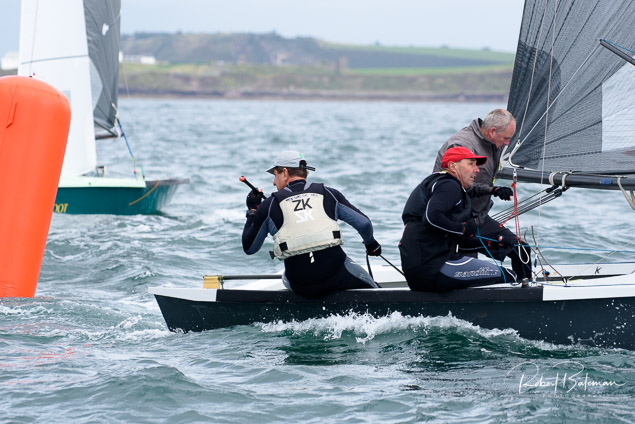
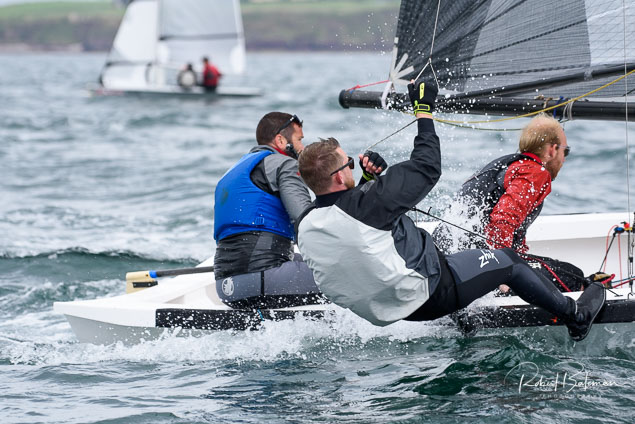
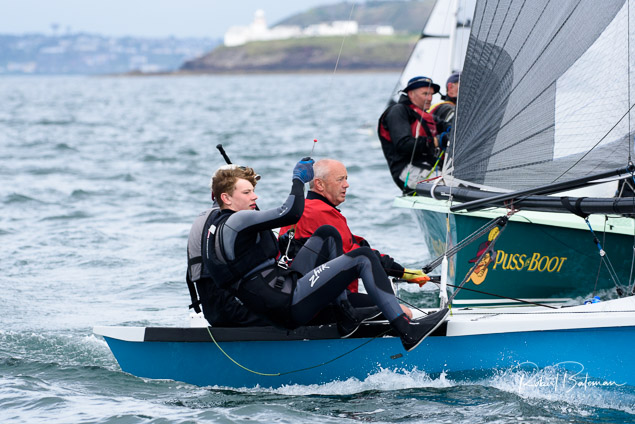
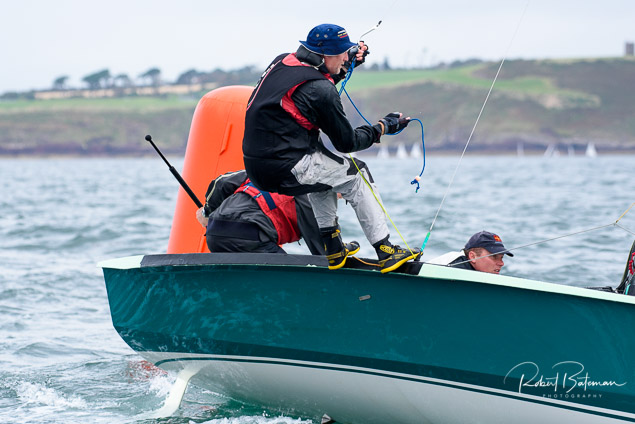
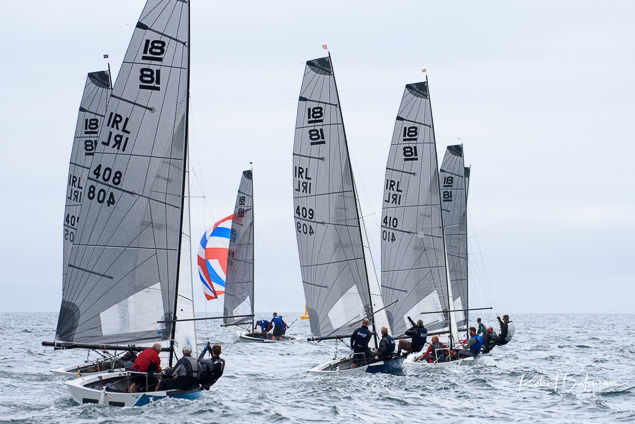
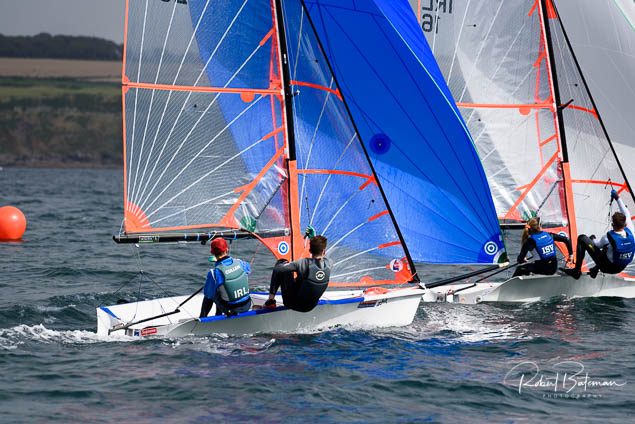
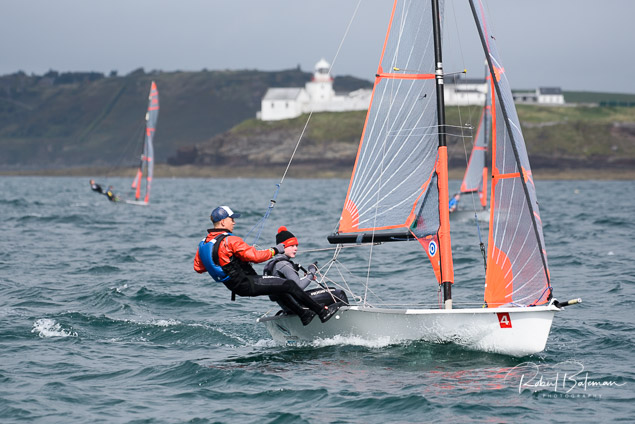
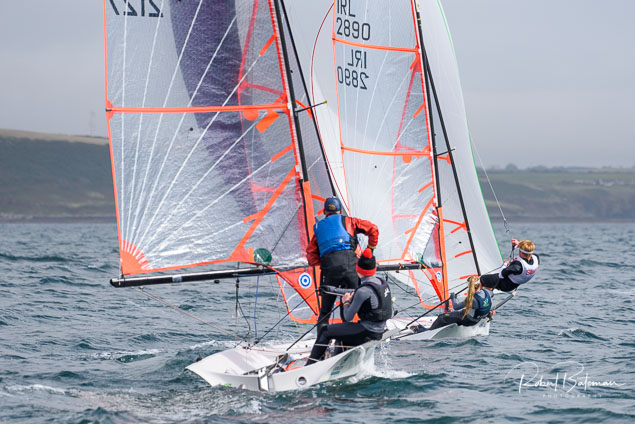
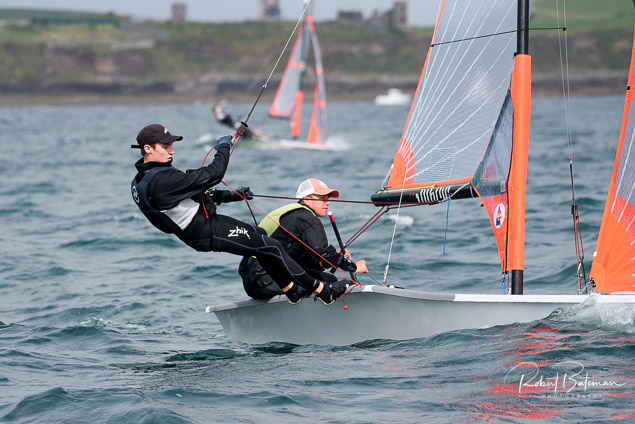
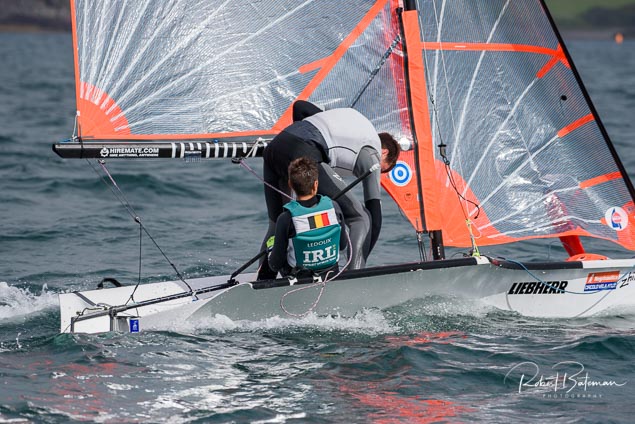
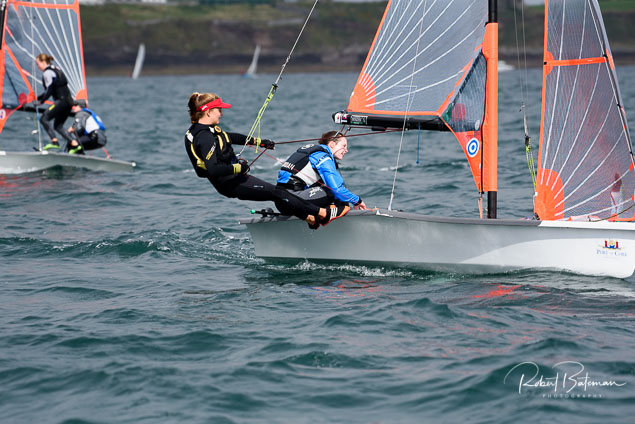
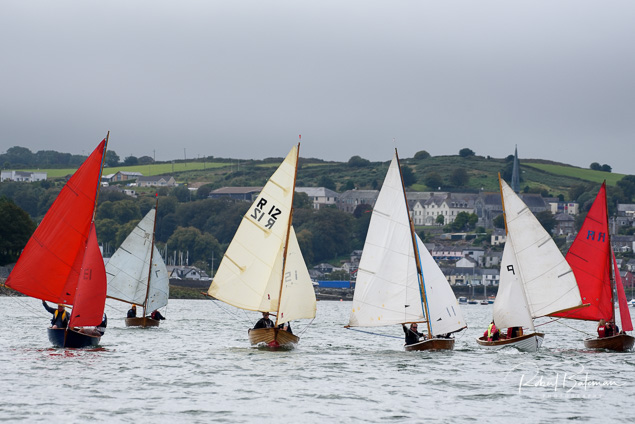
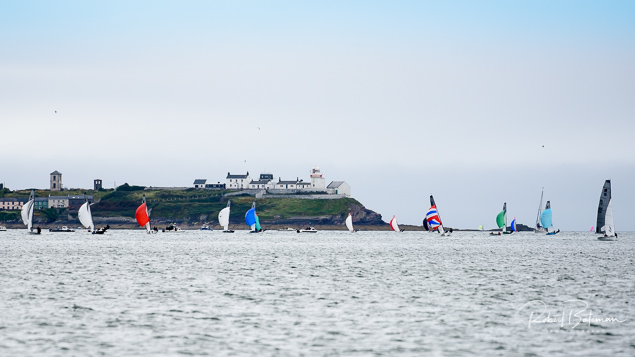
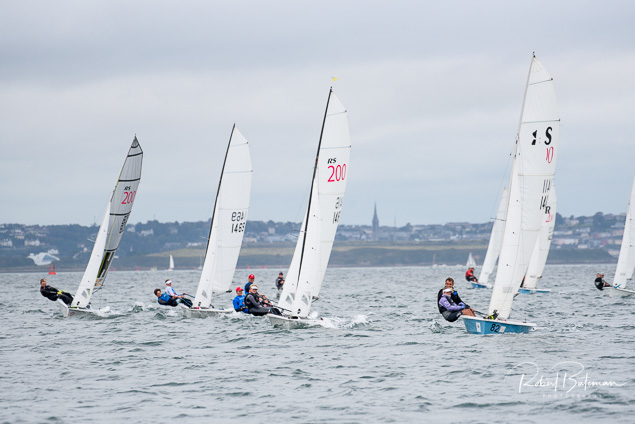
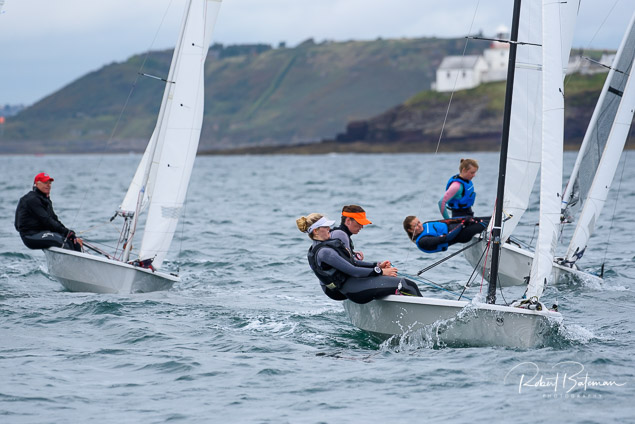
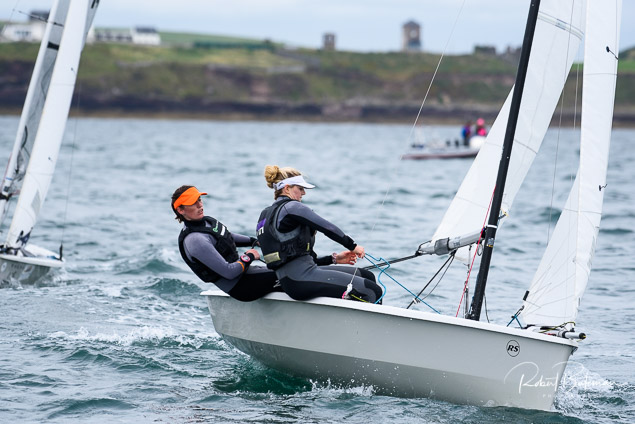
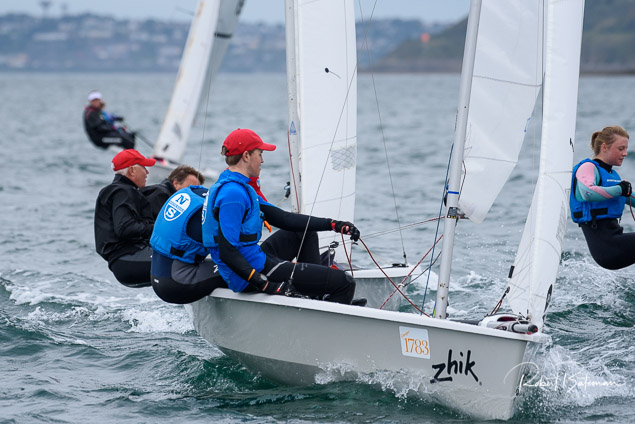
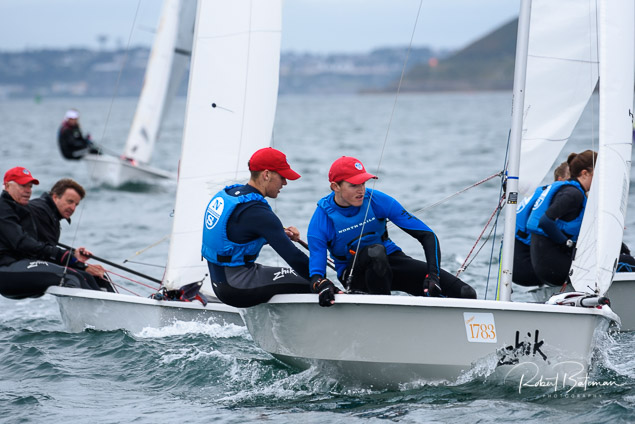
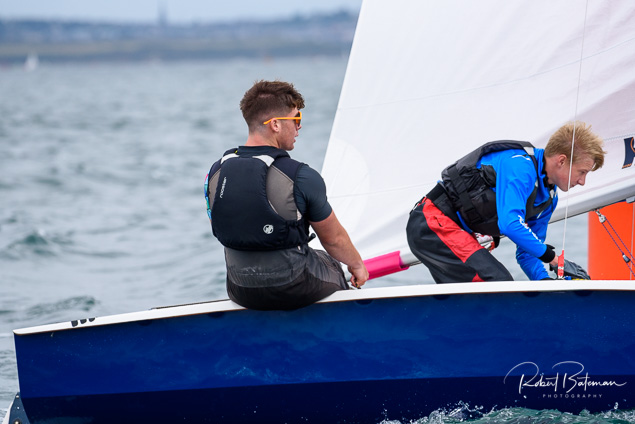
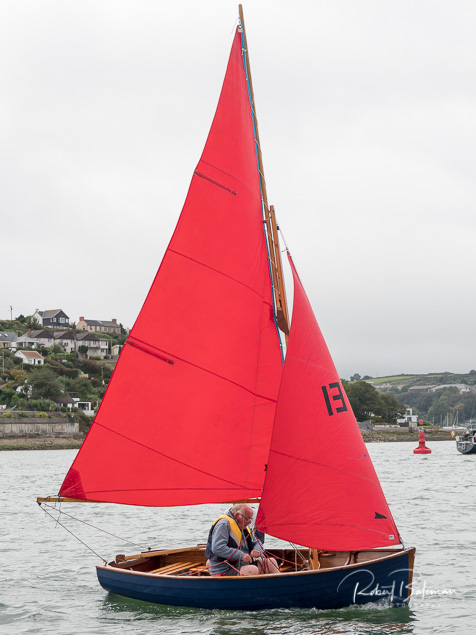
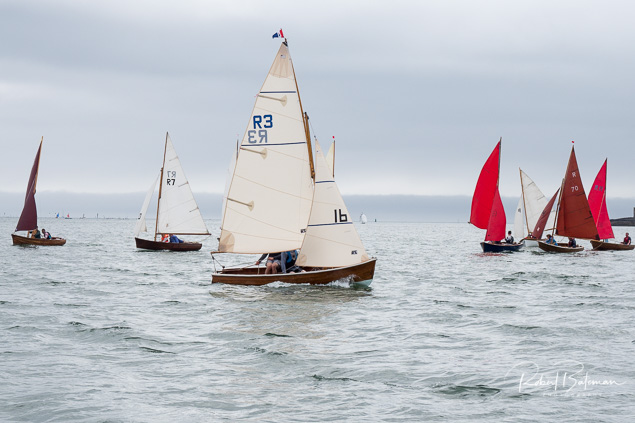
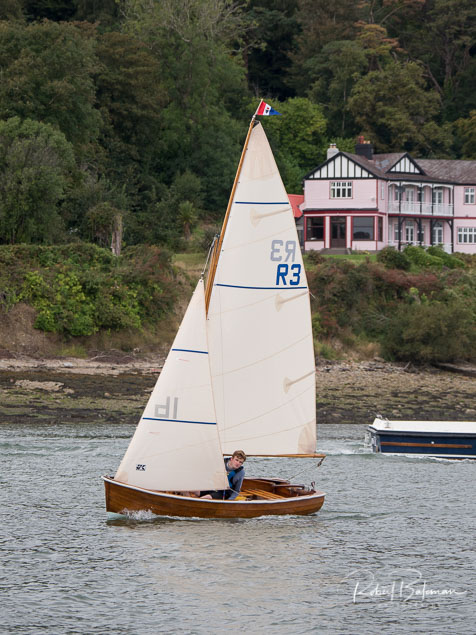
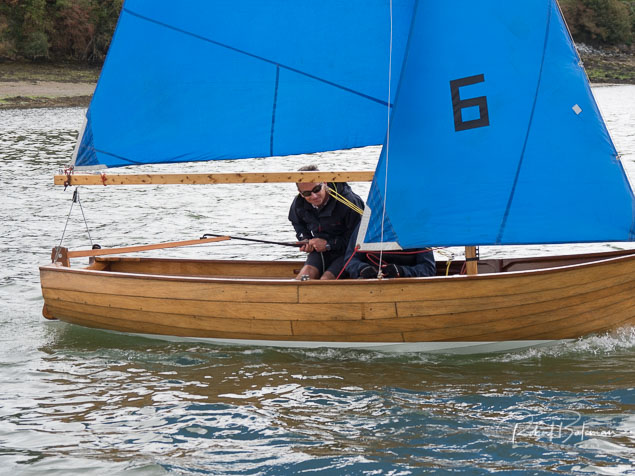
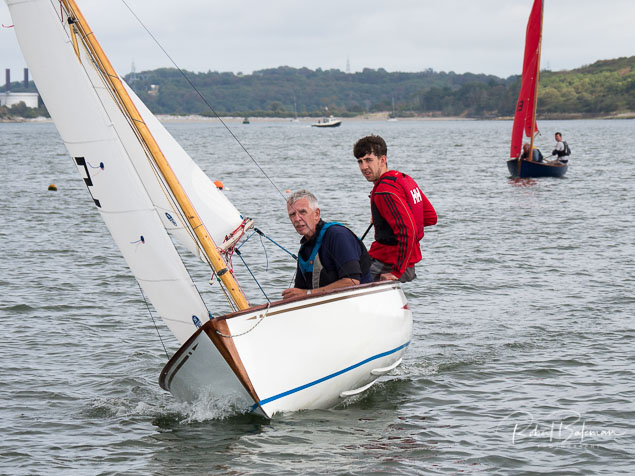
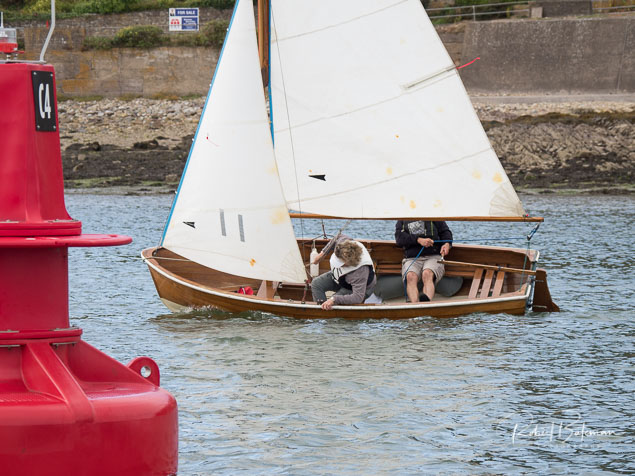
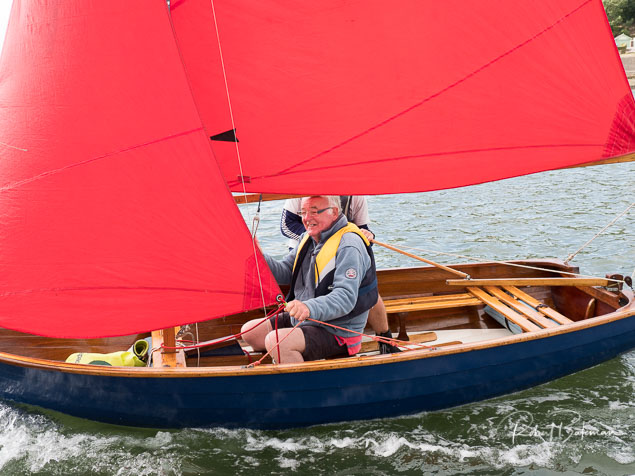
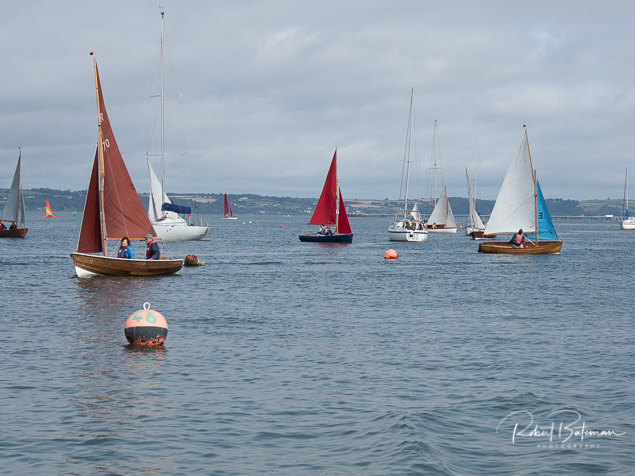
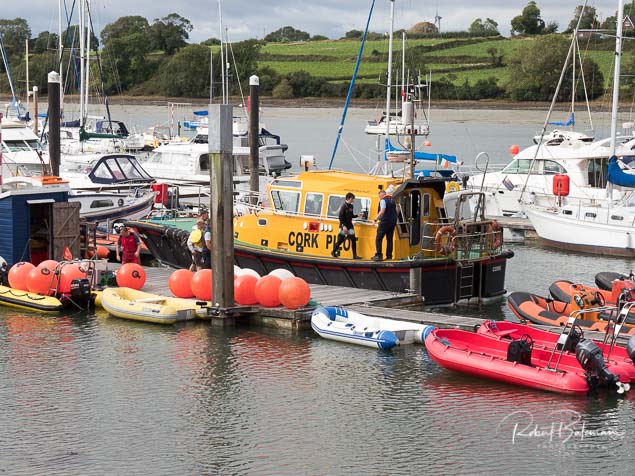
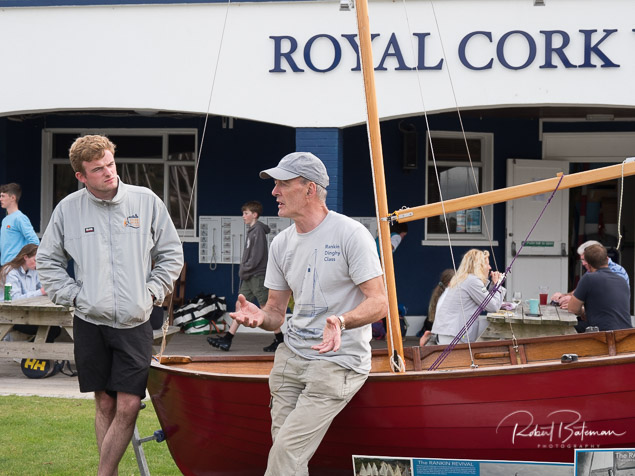
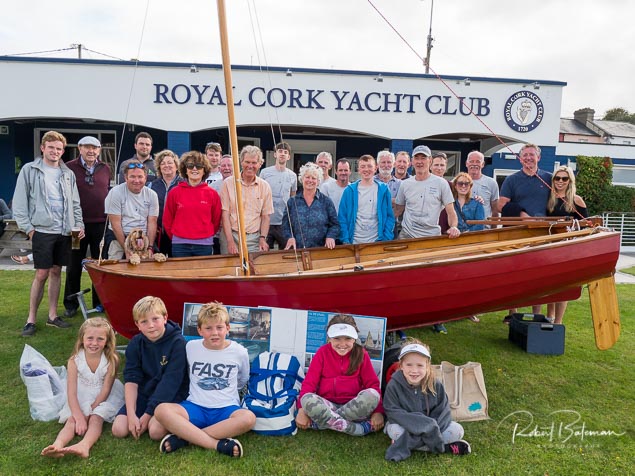
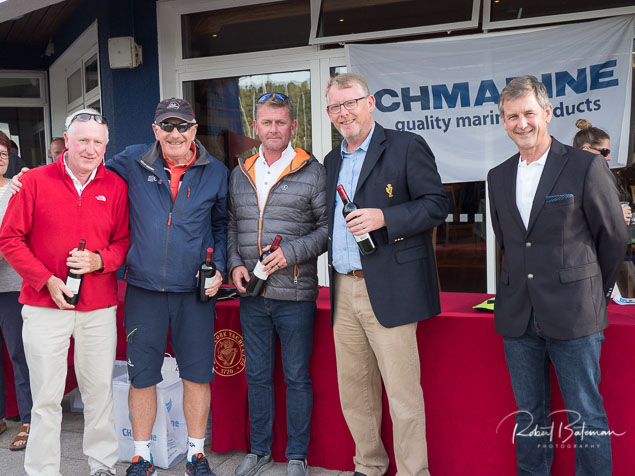
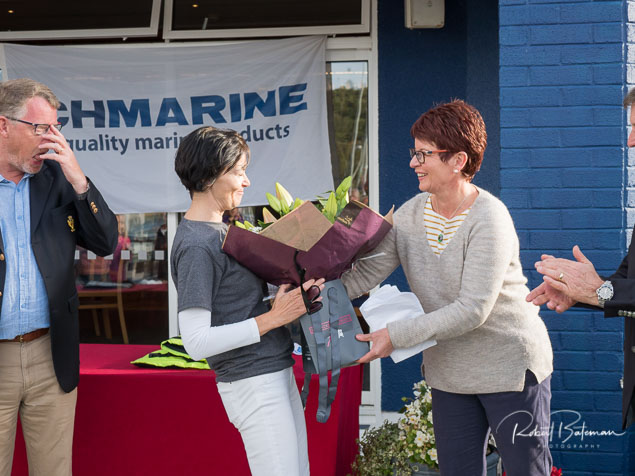
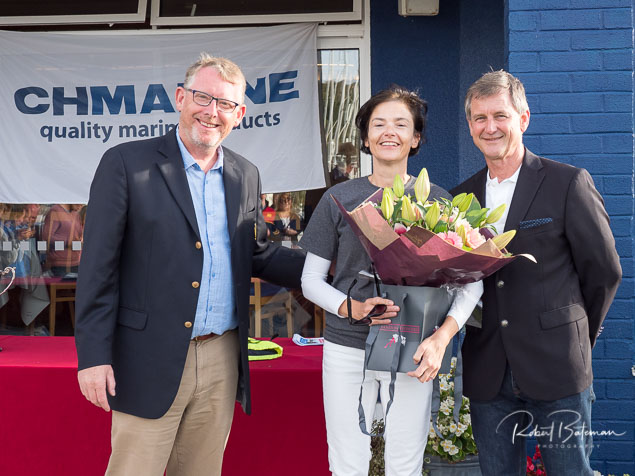
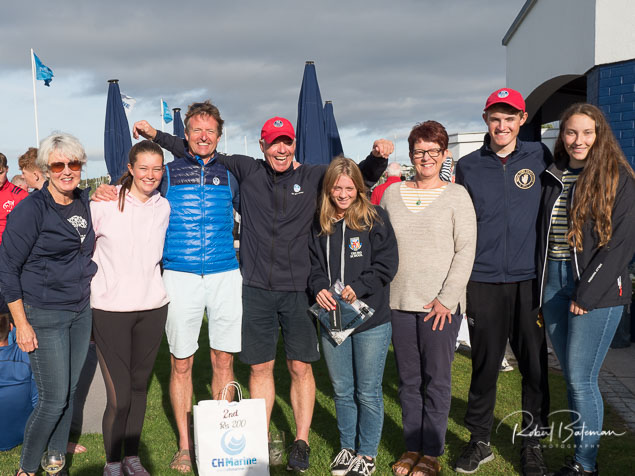
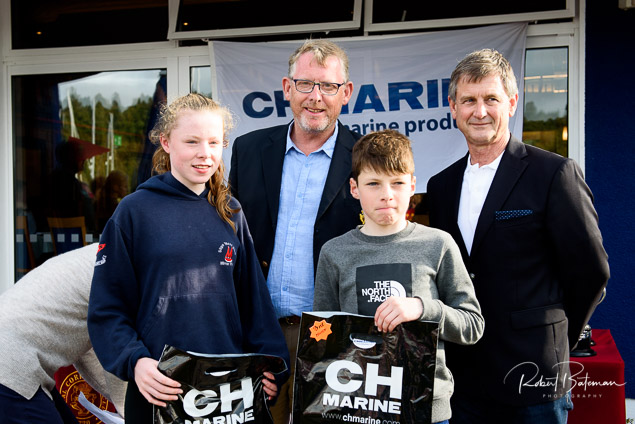
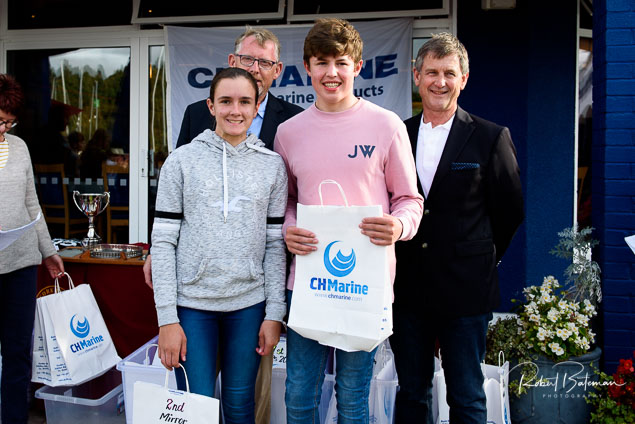
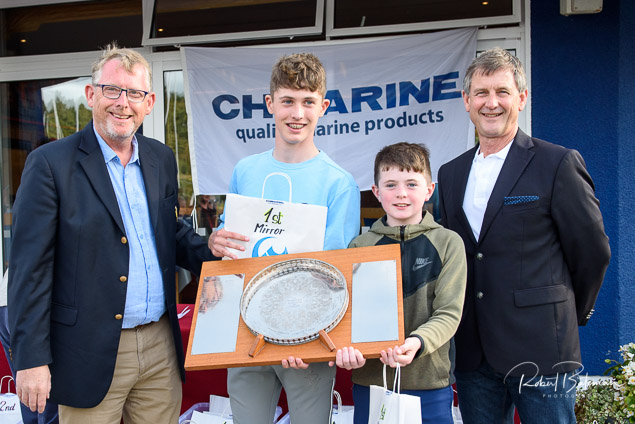
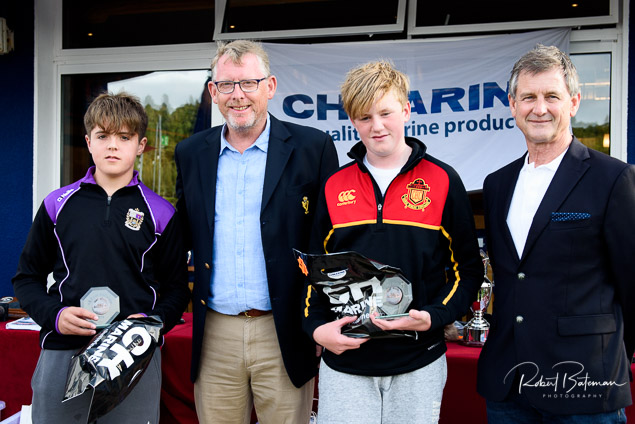
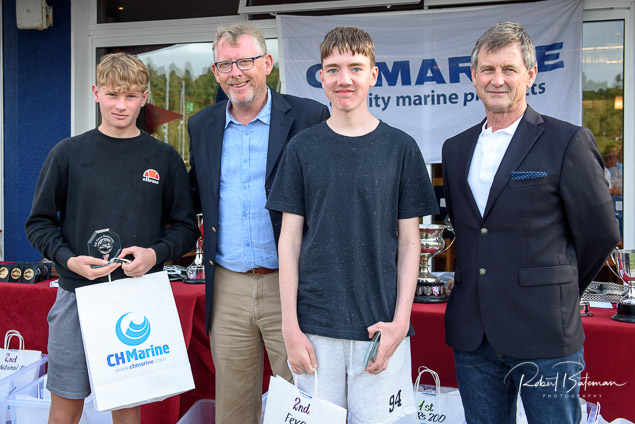
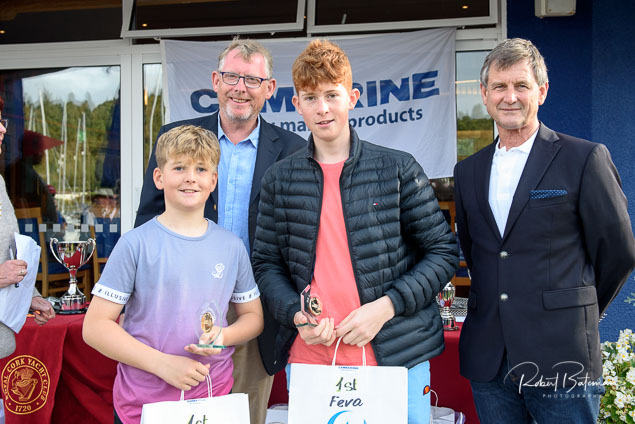
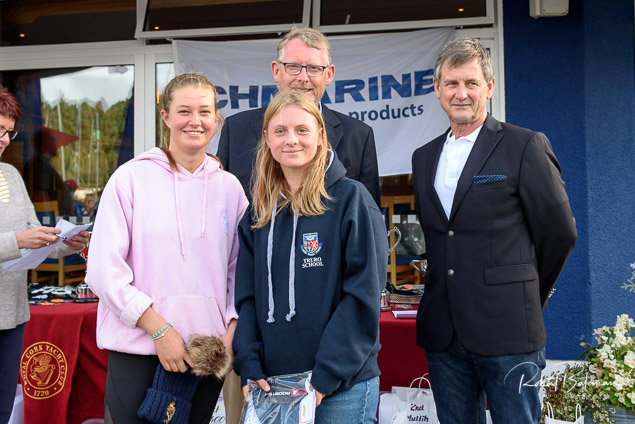
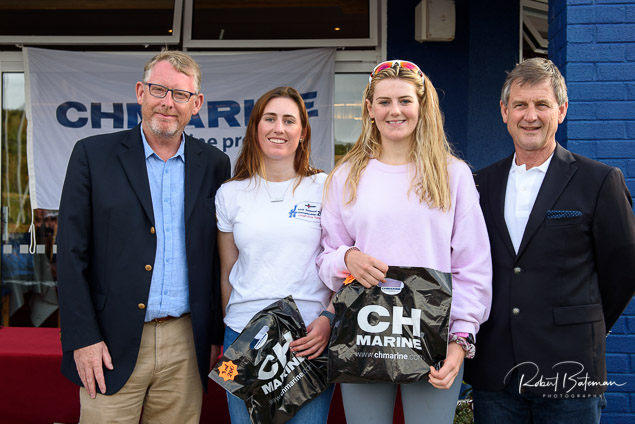
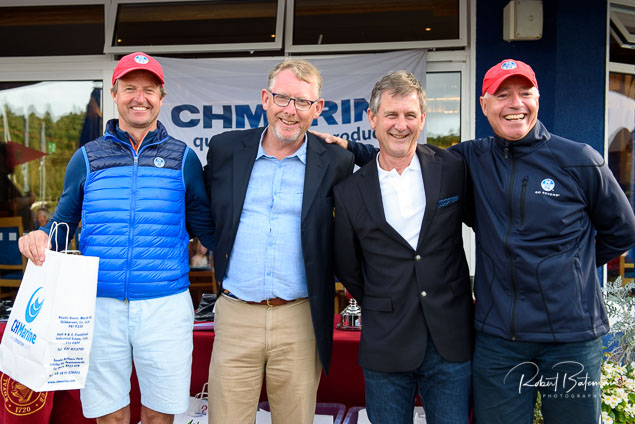
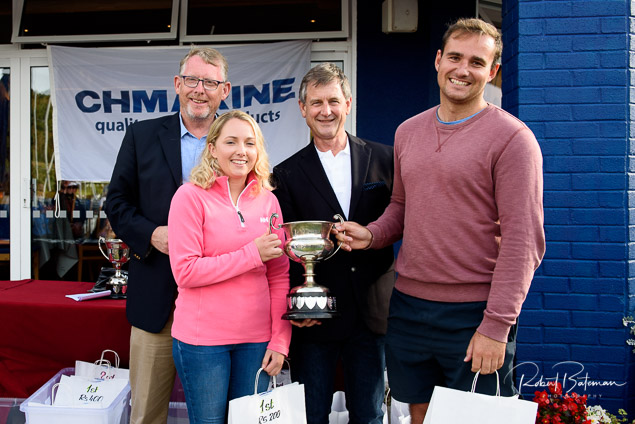
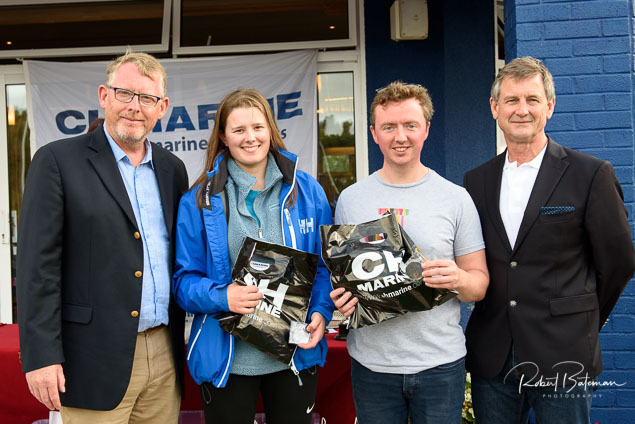
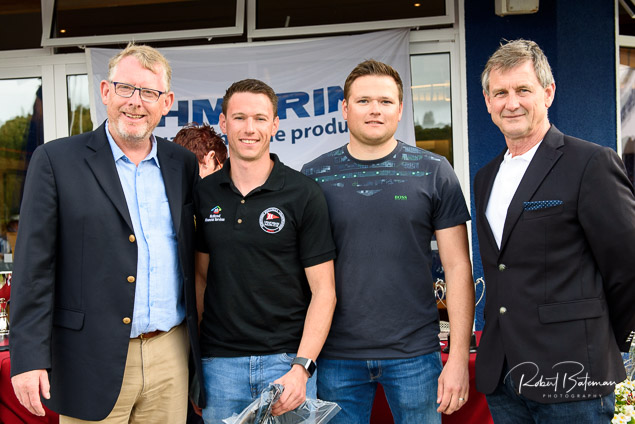
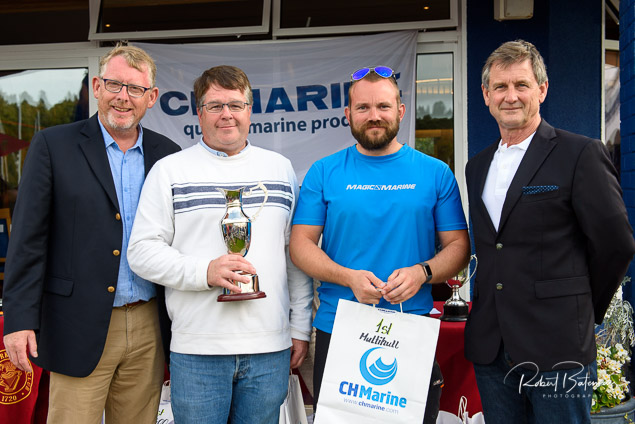
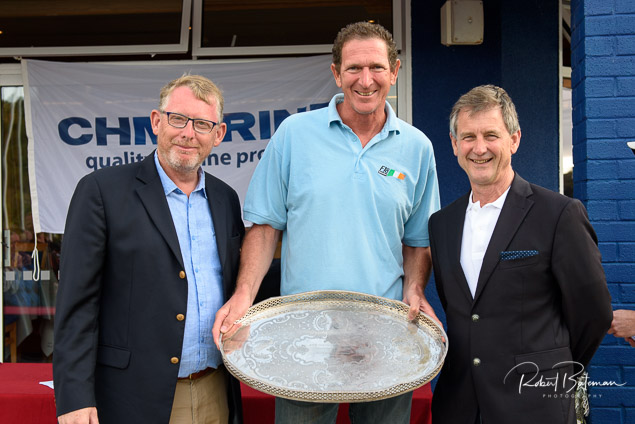
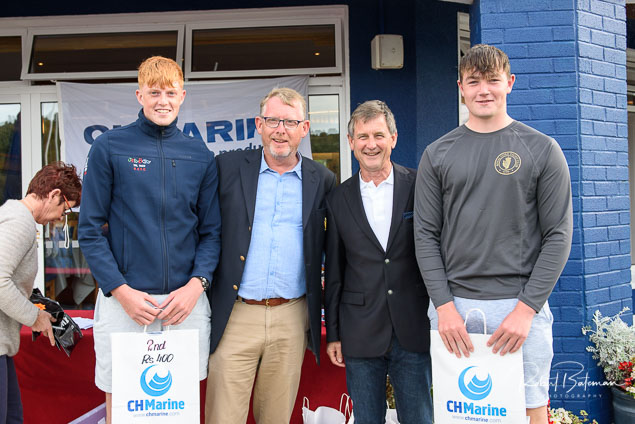
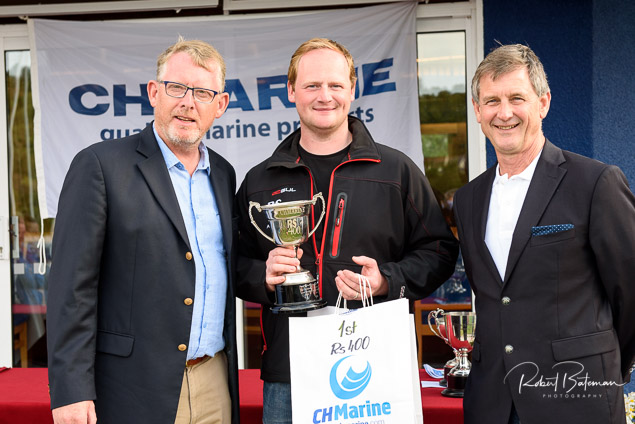
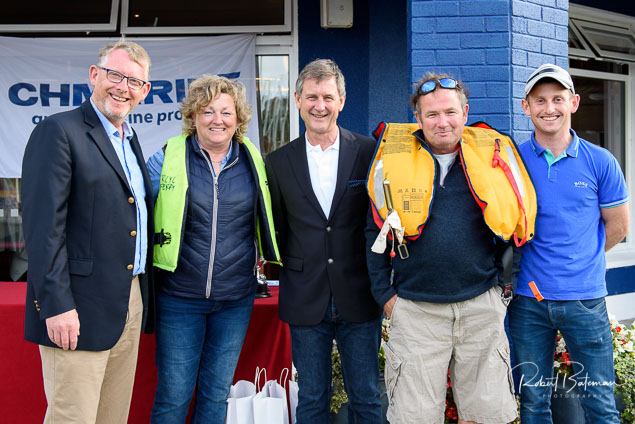
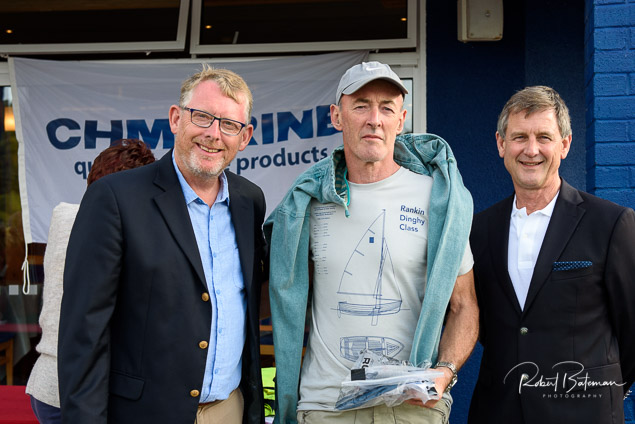
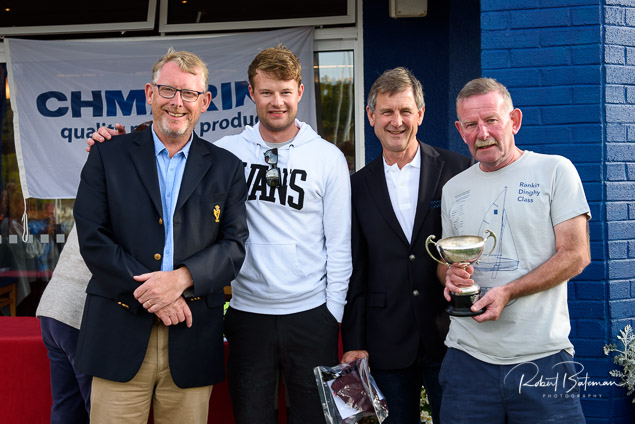
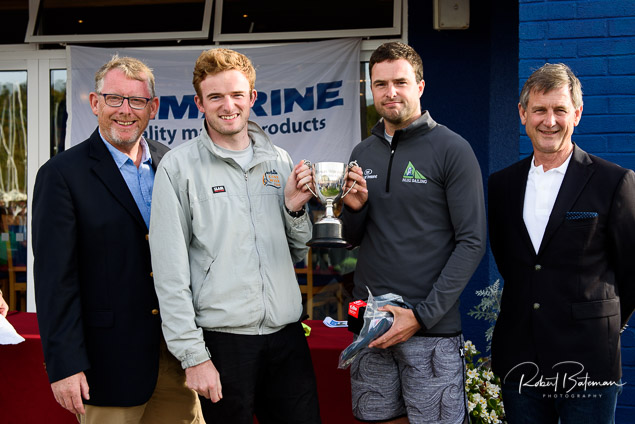
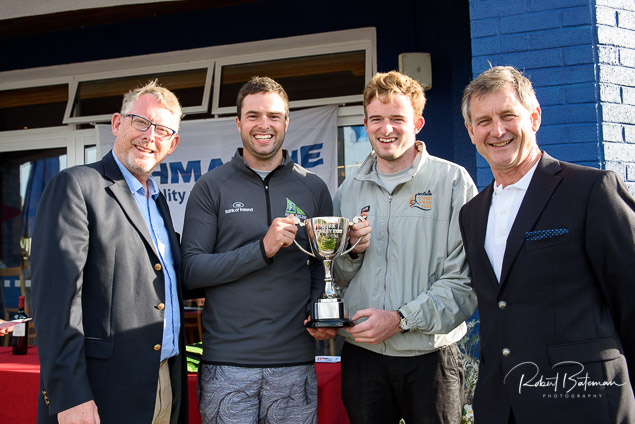
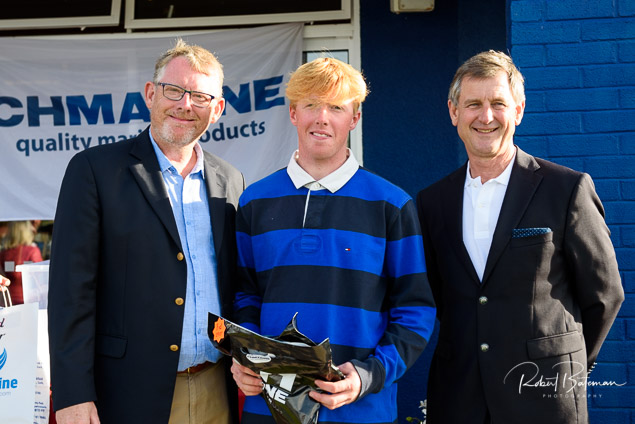
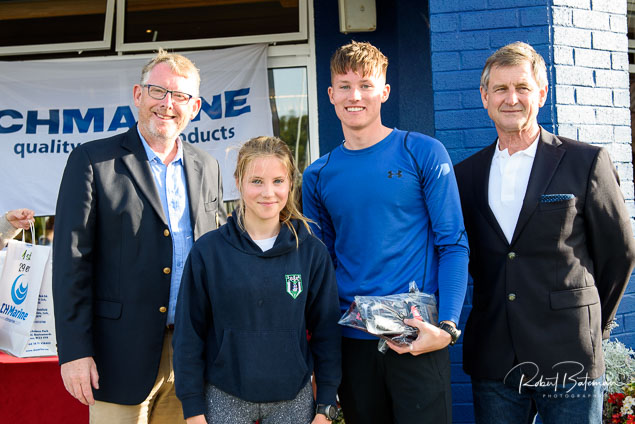
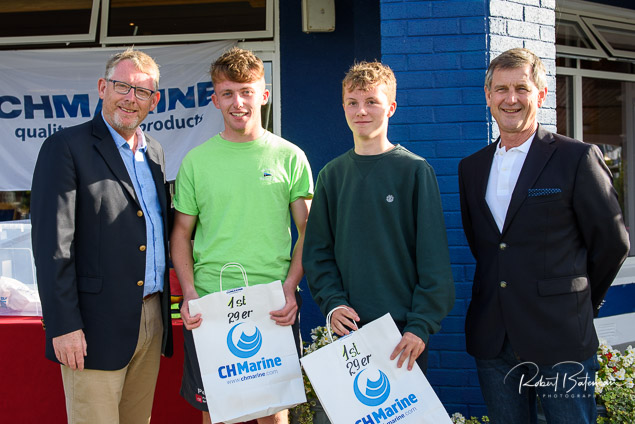
Claiming to be the 'largest stand-alone dinghy festival event in the country', the official launch of Cork Dinghy Fest took place in the Royal Cork Yacht Club last week.
Royal Cork Yacht Club Rear Admiral Brian Jones was joined by volunteers and sailors as they marked the announcement of the continued sponsorship and support from CH Marine and the Port of Cork for the popular biennial event.
As Afloat reported previously, Event chairman Alex Barry is looking forward to another great event and was very excited to announce that DinghyFest ’19 will play host to three national championships, four Southern Championships and even a world championships.
2019 is gearing up to be a great event, according to Barry, who says it was great to have such support from our sponsors this year. Barry is a strong advocate for dinghy sailing of any type, recently moving to a GP14 in advance of the Worlds in Skerries in 2020.
This year’s event will see boats of all shapes and sizes race over the two days with National Championships for Multihulls, National 18’s and RS Fevas, Southern Championships for RS 200s, 400s, 29ers and Mirrors and a world championships for the clinker-built Rankins of Cork Harbour. Strangely enough, the international entries have been slow to date for the Rankin, says Barry, but he’s holding out hope.
The event will take place on September 14th and 15th in the Royal Cork Yacht Club with entry and NOR available on the website here
Royal Cork's Nin O'Leary Wins Round the Island Race on Saturday, Returns for Dinghy Fest Duty on Sunday
Nicholas 'Nin' O'Leary has had a successful weekend on and off the water in two countries. The Royal Cork ace organised this weekend's successful Dinghy Fest Regatta for over 100–boats in Crosshaven but in Cowes, UK, he also took Adam Gosling's JPK 10.80 YES! to an overall win of the 1342–boat Round the Island Race.
There were still a few hundred boats needing to finish their 2017 Round the Island Race yesterday, but mathematically none of them were able to dislodge Gosling's Irish crewed YES! from the top of the overall results, hence scoring them the biggest trophy of the day, the Gold Roman Bowl.
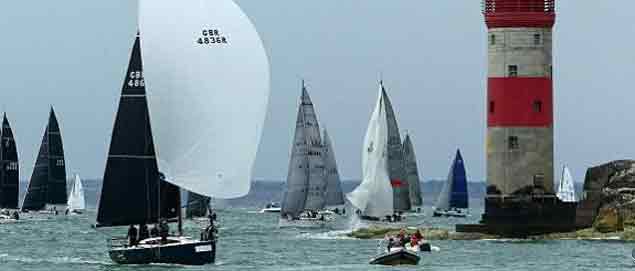 YES! Winners of the top trophy, the Gold Roman Bowl. Photo: Tony Marsh
YES! Winners of the top trophy, the Gold Roman Bowl. Photo: Tony Marsh
Gosling's crew included O'Leary and James Hynes. O'Leary, who was race director of Dinghy Fest at his Royal Cork Yacht Club, skipped to Cowes to participate in the massive UK race early on Saturday. As soon as O'Leary crossed the line, he was already making plans to be back in time to present the Dinghy Fest prizes at RCYC on Sunday.
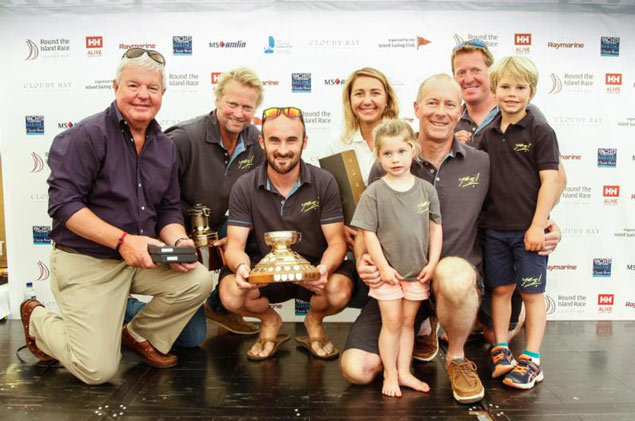 Adam Gosling & the crew of YES! joined by (left) Sir Keith Mills and Irish crew man James Hynes of Malahide (back row, right). Missing is Nin O'Leary who is already on his way back to Cork to present Dinghy Fest prizes (below). Photo: Paul Wyeth
Adam Gosling & the crew of YES! joined by (left) Sir Keith Mills and Irish crew man James Hynes of Malahide (back row, right). Missing is Nin O'Leary who is already on his way back to Cork to present Dinghy Fest prizes (below). Photo: Paul Wyeth
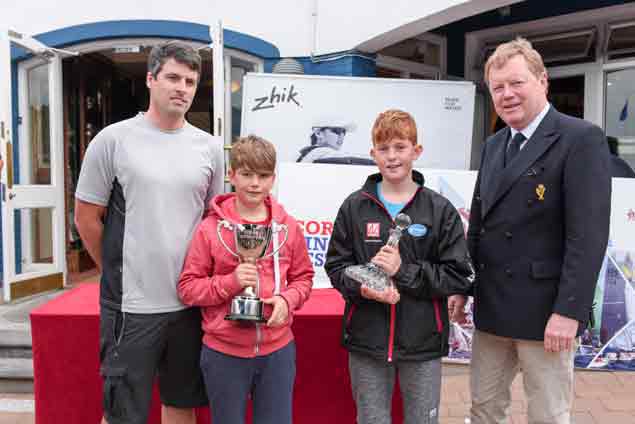 Round the Island race winner O'Leary (left) on Sunday afternoon with RCYC Admiral John Roche presenting the overall Dinghy Fest award to RS Feva sailors Harry and Simon Pritchard. Photo: Bob Bateman
Round the Island race winner O'Leary (left) on Sunday afternoon with RCYC Admiral John Roche presenting the overall Dinghy Fest award to RS Feva sailors Harry and Simon Pritchard. Photo: Bob Bateman
Often they say that the race is won either by the biggest or the smallest boats and for a time it looked like this would be a big boat race, after an impressive performance from Irvine Laidlaw's Reichel-Pugh 82, Highland Fling XI.
However, with Fling sitting at the top of the results table, Yes! and much of the rest of the IRC1 fleet within which she was racing, stormed home to dislodge a number of previous finishers from the top positions.
Highland Fling did manage to hold onto second, but ultimately Yes! was in another league taking victory by just under eight minutes corrected. Gosling's team a well-known group in the Solent and have won a great many trophies and plaudits but the Round the Island Race win had thus far eluded them.
They join a very special group of 81 winners from the illustrious race.
Alex Barry and Richard Leonard successfully defended their RS400 Southern Championship crown this afternoon at Royal Cork Yacht Club. The dinghy duo were just one of many winners at the second edition of the multi–dinghy championships in Cork Harbour that attracted over 100 boats.
The three day event produced some very tight racing in spectacular conditions for the centreboard classes as illustrated in Bob Bateman's RCYC Dinghy Fest Galleries on Day One, Day two and Day three (including prizegiving).
As reported in our Dinghy Fest preview, also running as part of the weekend was the RS 200 Euro Cup & Irish National Championships, the National 18 National Championships, the RS Feva and RS 400 Southern Championships plus a PY fleet an Optimist fun Fleet and a demo Moth fleet.
Barry and Leonard beat Belfast Lough's Gareth Flannigan and David Fletcher of Ballyholme Yacht Club for the top prize after six races by one point in a 12–boat fleet.
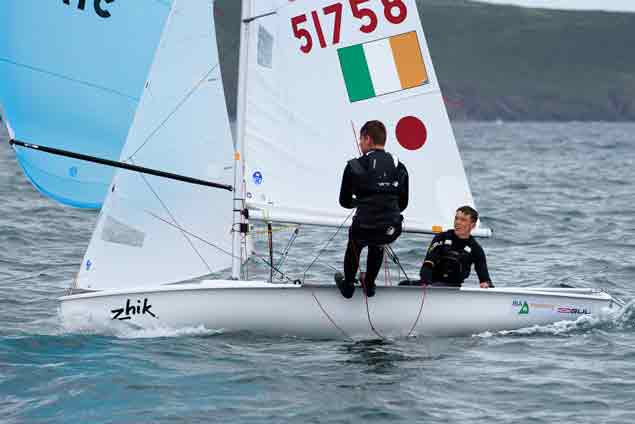 Geoff Power and James McCann, 420 National Champions. Photo: Bob Bateman
Geoff Power and James McCann, 420 National Champions. Photo: Bob Bateman
This month's Kiel Week top ten performers, Geoff Power and James McCann were winners of the 15-boat 420 Irish Championships after nine races but only by a single point from Kinsale Yacht Club's Micheal O'Suilleabhain and Michael Carroll. Third were Dublin's Kate Lyttle and Niamh Henry from the Royal St George YC.
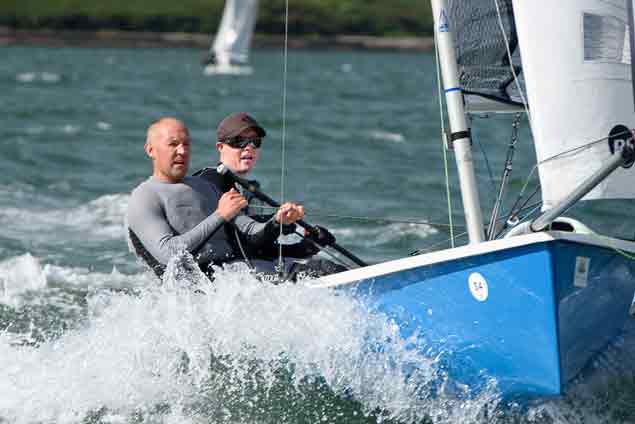 Neil Spain and Shane Hughes were RS200 Euro Cup and Irish National Championships winners. Photo: Bob Bateman
Neil Spain and Shane Hughes were RS200 Euro Cup and Irish National Championships winners. Photo: Bob Bateman
In the biggest Fest fleet, Neil Spain and Shane Hughes of Howth Yacht Club were winners by three points after nine races in the 21–boat RS200 fleet. Greystones Sailing Club's Marty O'Leary and Rachel Williamson were second and RStGYC's Sean Craig and Rosemary Tyrell were third.
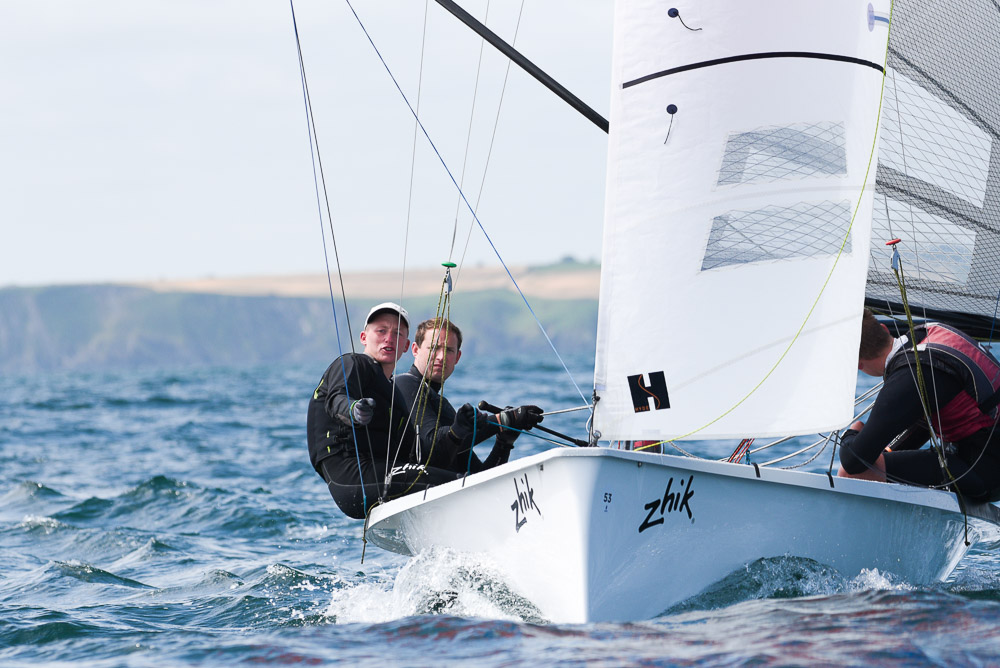 Charles Dwyer was the winner of a nine–boat National 18 fleet
Charles Dwyer was the winner of a nine–boat National 18 fleet
The National 18 fleet did not make double figures for its national championships on home waters which is somewhat disappointing given the hype around its new Morrisson design. Royal Cork's Charles Dwyer beat Tom Dwyer with Ewen Barry of Monkstown Bay Sailing Club third.
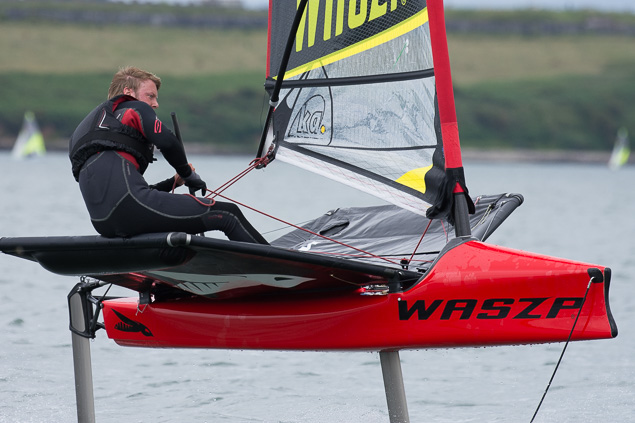 John Chambers on the new Waszp foiler Photo: Bob Bateman
John Chambers on the new Waszp foiler Photo: Bob Bateman
Rory Fitzpatrick beat Neill O'Toole in a battle of the Moth's with John Chambers WasZP debut third of three foilers in the weekend's 'Extreme fleet'.
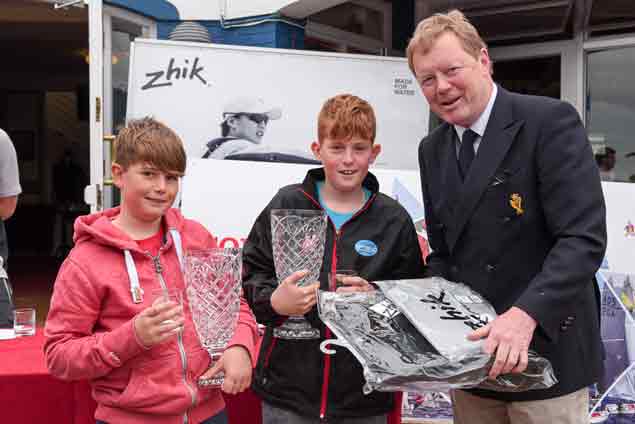 Harry and Simon Pritchard were RS Feva Southern Championships winners. The pair were also crowned Dinghy Fest 2017 Champions on the basis of their scoresheet: six race wins out of six! Photo: Bob Bateman
Harry and Simon Pritchard were RS Feva Southern Championships winners. The pair were also crowned Dinghy Fest 2017 Champions on the basis of their scoresheet: six race wins out of six! Photo: Bob Bateman
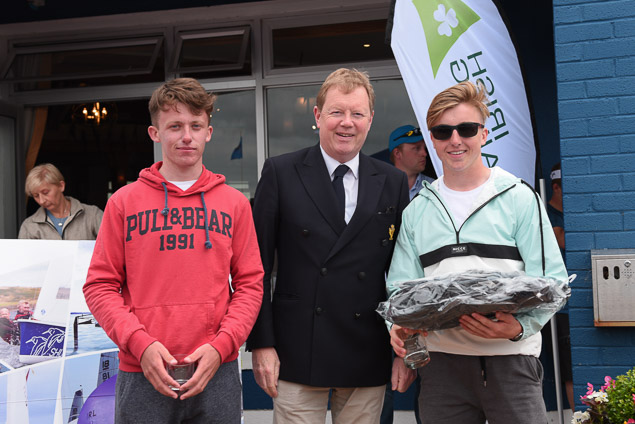 Harry Durcan and Harry Whitaker won the Dinghy Fest mixed dinghies fleet Photo: Bob Bateman
Harry Durcan and Harry Whitaker won the Dinghy Fest mixed dinghies fleet Photo: Bob Bateman
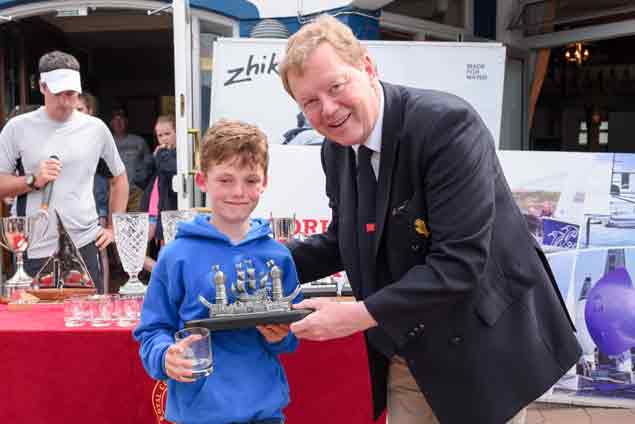 JP Curtin, the Optimist Fun Fleet Winner. Photo: Bob Bateman
JP Curtin, the Optimist Fun Fleet Winner. Photo: Bob Bateman
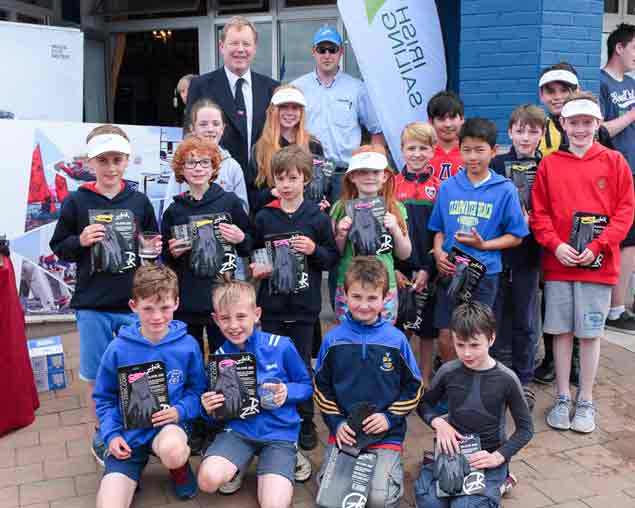 The Optimist Dinghy Fest fun fleet Photo: Bob Bateman
The Optimist Dinghy Fest fun fleet Photo: Bob Bateman
Results are here
Now the largest stand alone dinghy festival event in the country, the official launch of Cork Dinghy Fest took place in the Royal Cork Yacht Club last week with representatives from event sponsors, CH Marine, Zhik and the Port of Cork all present. Chairman for the event Nicolas O’Leary was accompanied by Royal Cork Yacht Club Vice Admiral Pat Farnan and Rear Admiral for Dinghies Stephen O’Shaughnessy.
Nicolas O’Leary, event chairman is looking forward to another great event and was very excited with the new introduction of the extreme fleet for the 2017 event, the arena style racing for foiling Moths and 29’er etc. will be a great spectacle for everyone.
2017 is gearing up to be a great event, says O'Leary, who says it was great to have such support from our sponsors this year.
As previously reported by Afloat.ie, returning to Cork Dinghy Fest are the ever strong and growing RS fleet of RS 400’s, 200’s and Fevas. The feature event this year is the RS 200 National Championships and Euro Cup, and having seen a surge in popularity in Cork this winter, over 30 boats are expected in the RS 200 fleet alone.
Also return is the 420 class, they will be deciding their national champion again during Cork Dinghy Fest. While the National 18-foot class will be holding their National Championships.
Green Light for Royal Cork Dinghy Fest 2017 – June 30 to July 2
Dinghy and keelboat sailor Nicholas O'Leary introduces Cork Dinghy Fest to be staged in Cork Harbour in 2017
I’m delighted that the Royal Cork Yacht Club has given the green light to host the Cork Dinghy Festival 2017 on June 30th through to July 2nd.
It has been by the grace of God that I’ve grown up on the waters of the second largest natural harbour in the world which has been my playground for the last 25 years of sailing.
The huge expanse of water allows for such an event to happen with over 200 entries attending in its first edition. Of course, we need more than just great waters and the volunteers last time came up trumps making use of the array of facilities provided by the Royal Cork and surrounding harbour clubs. Monkstown Bay SC looked after the Optimist Fun Fleet which saw 20 kids between 5-8 years of age experiencing a major event for the first time, it brought back great memories seeing my old Opti “El Nino” being sailed in 2015.
The sole purpose of the event from my perspective is to get the variety of fleets together in one location, enjoying their competitive class racing ran by expert race officers and thereafter to socialise with friends of old onshore who they’d rarely see from one year to the next whilst competing within their own circuits. The four race courses of last year was a big undertaking but I was comfortable in the team of race officers, mark layers and safety teams afloat that it would be under control. As I am competitive sailor and personality, there will be changes from last time of course, it’s only natural to learn from previous lessons and thrive for better a performance next time round, on and off the water.
We have been in contact with various fleets for the next edition and all I can say is it’s going to be exciting to see foiling vessels flying across Cork Harbour. Until classes have drawn up their own calendar of events and finalised AGM notes we cannot announce our various classes just yet. Watch this space.
Nicholas O'Leary, Cork Dinghy Fest 2017


























